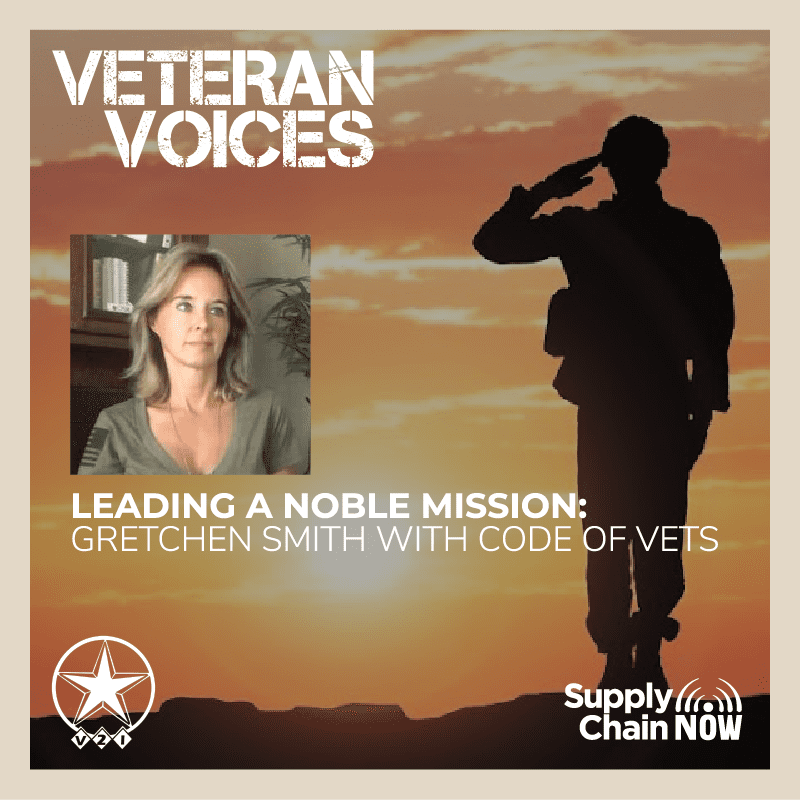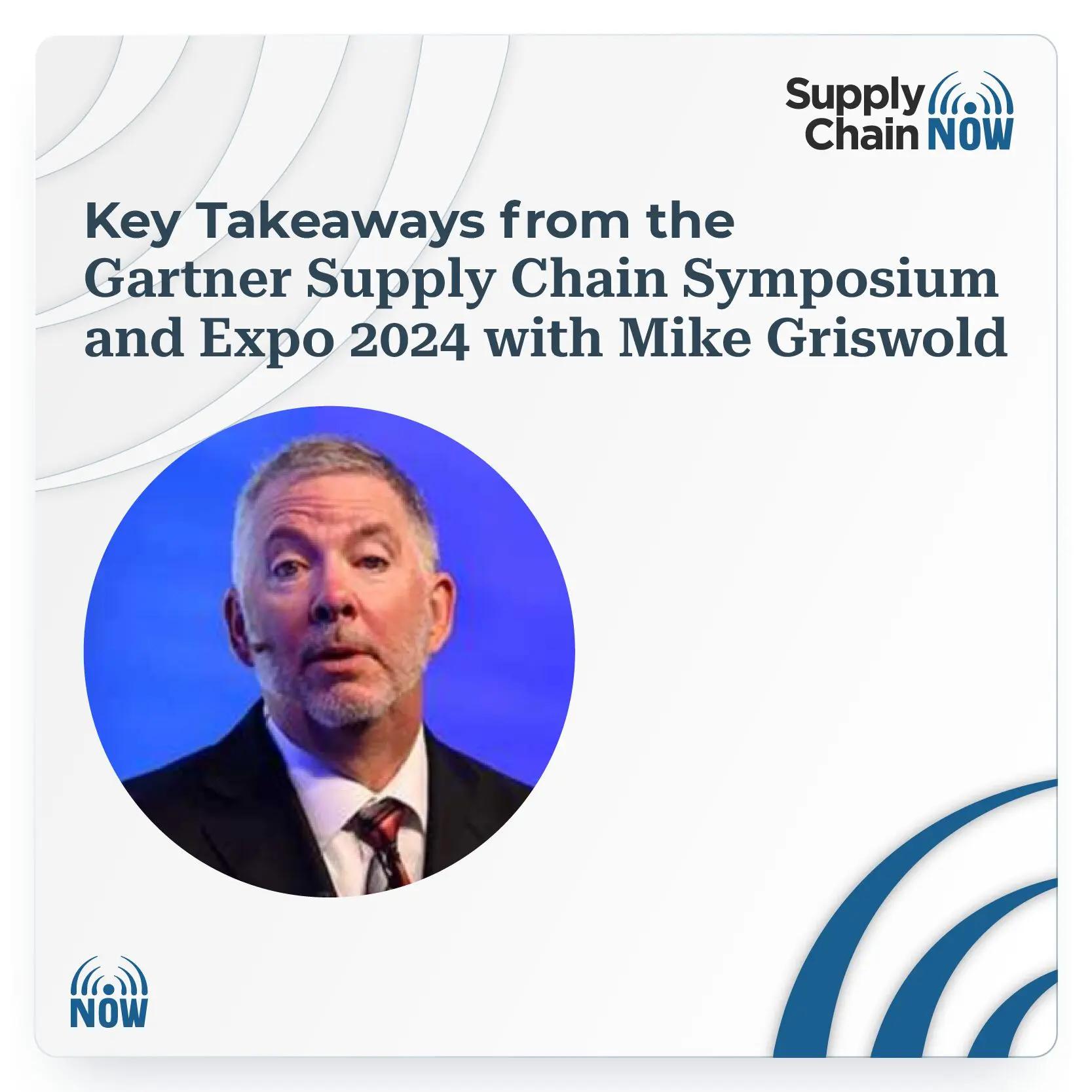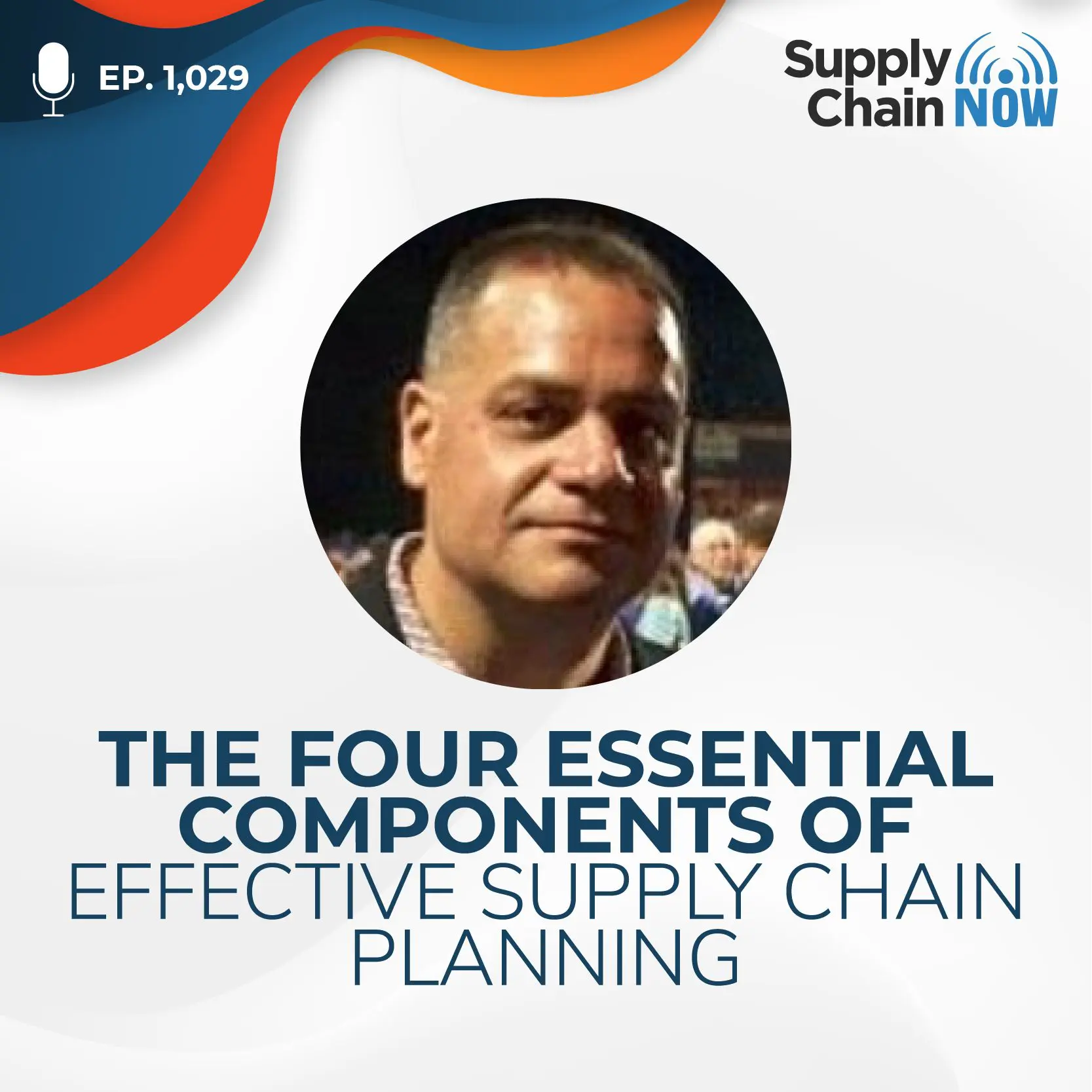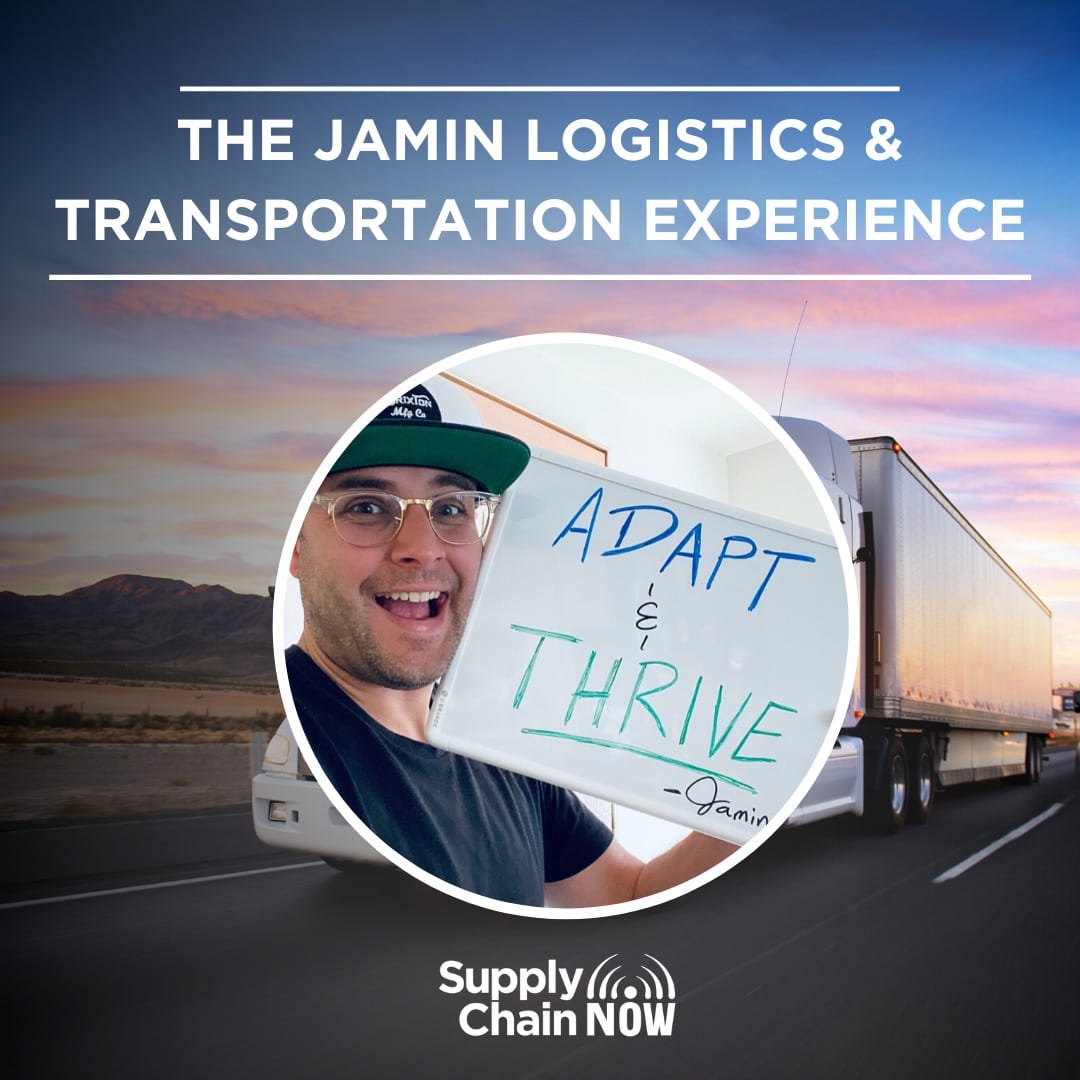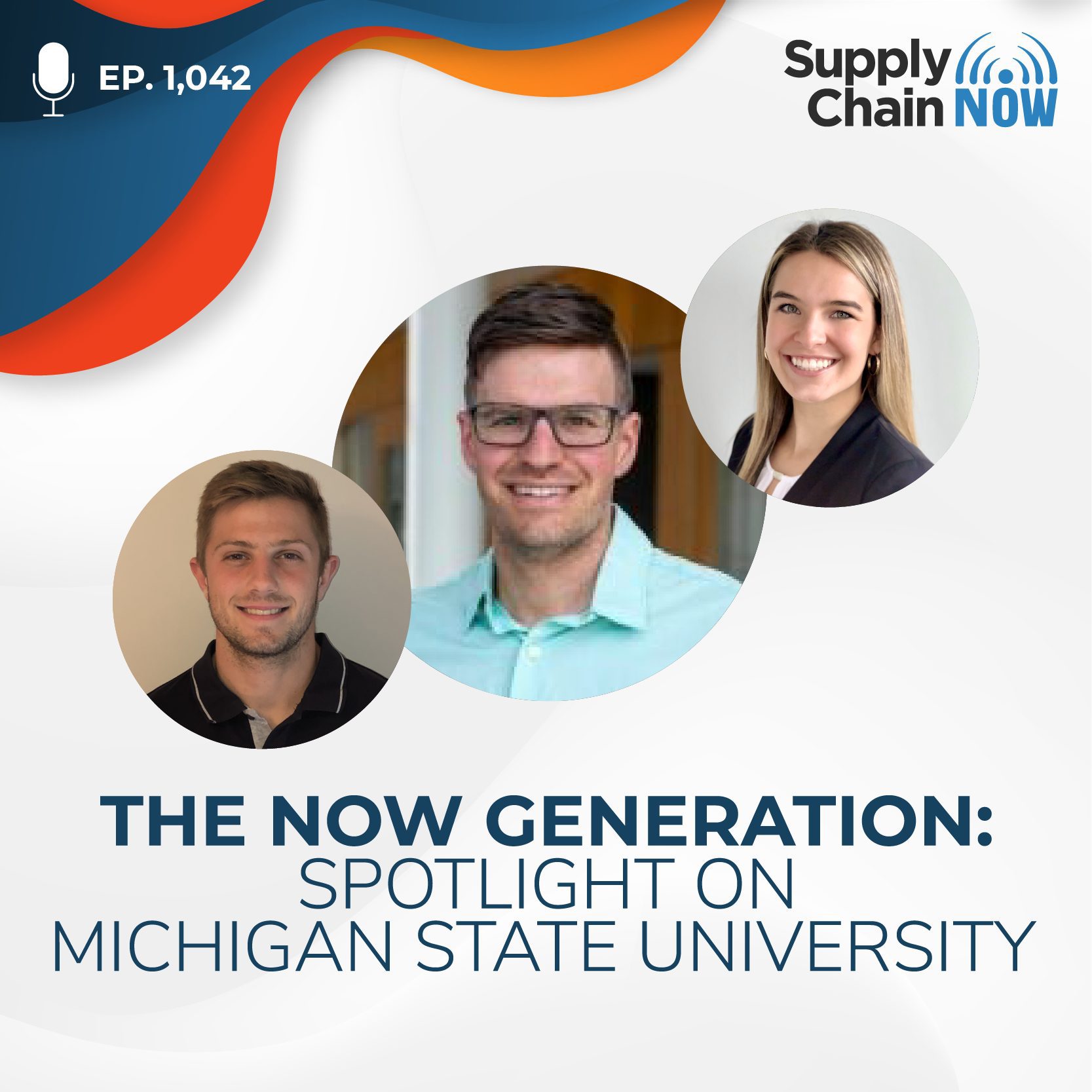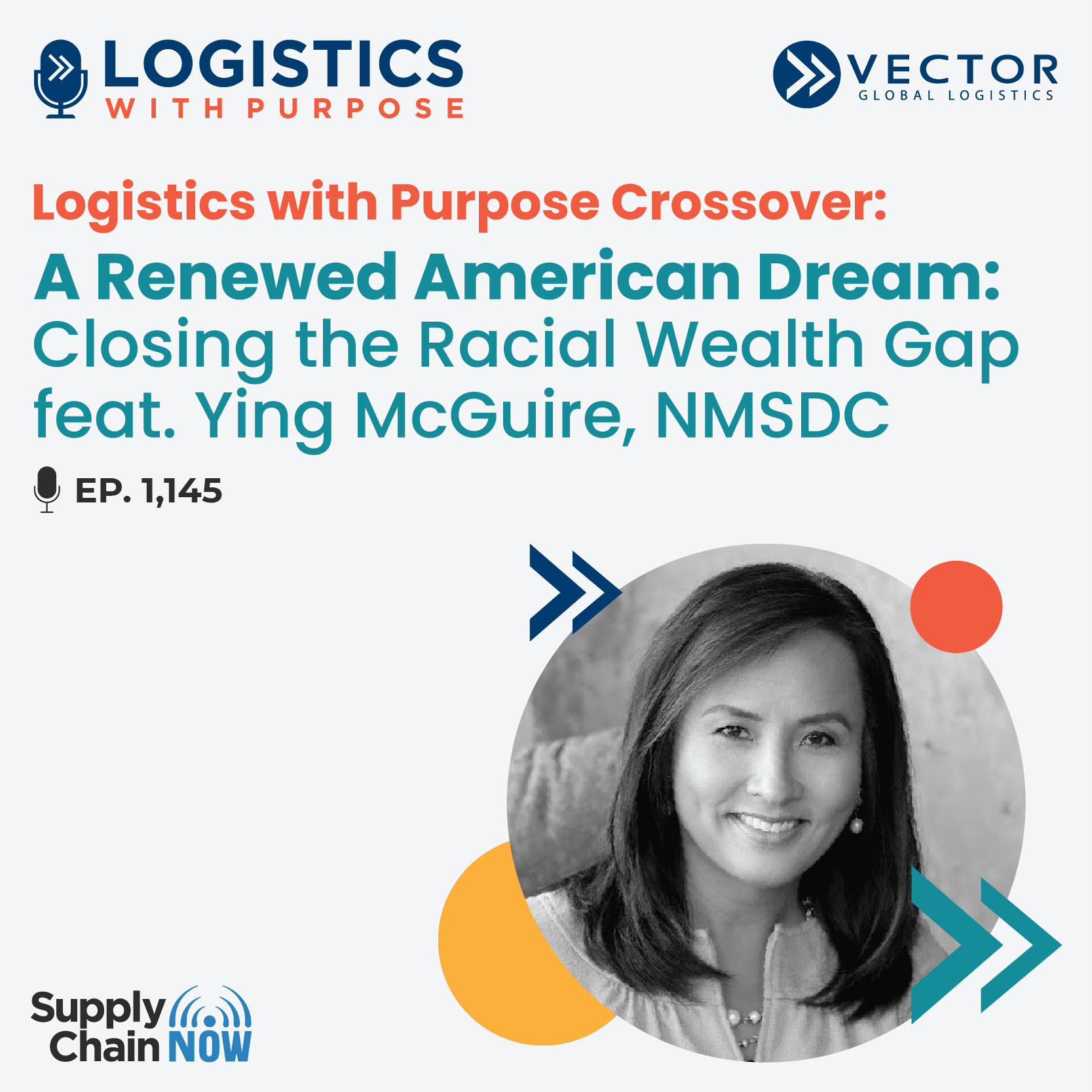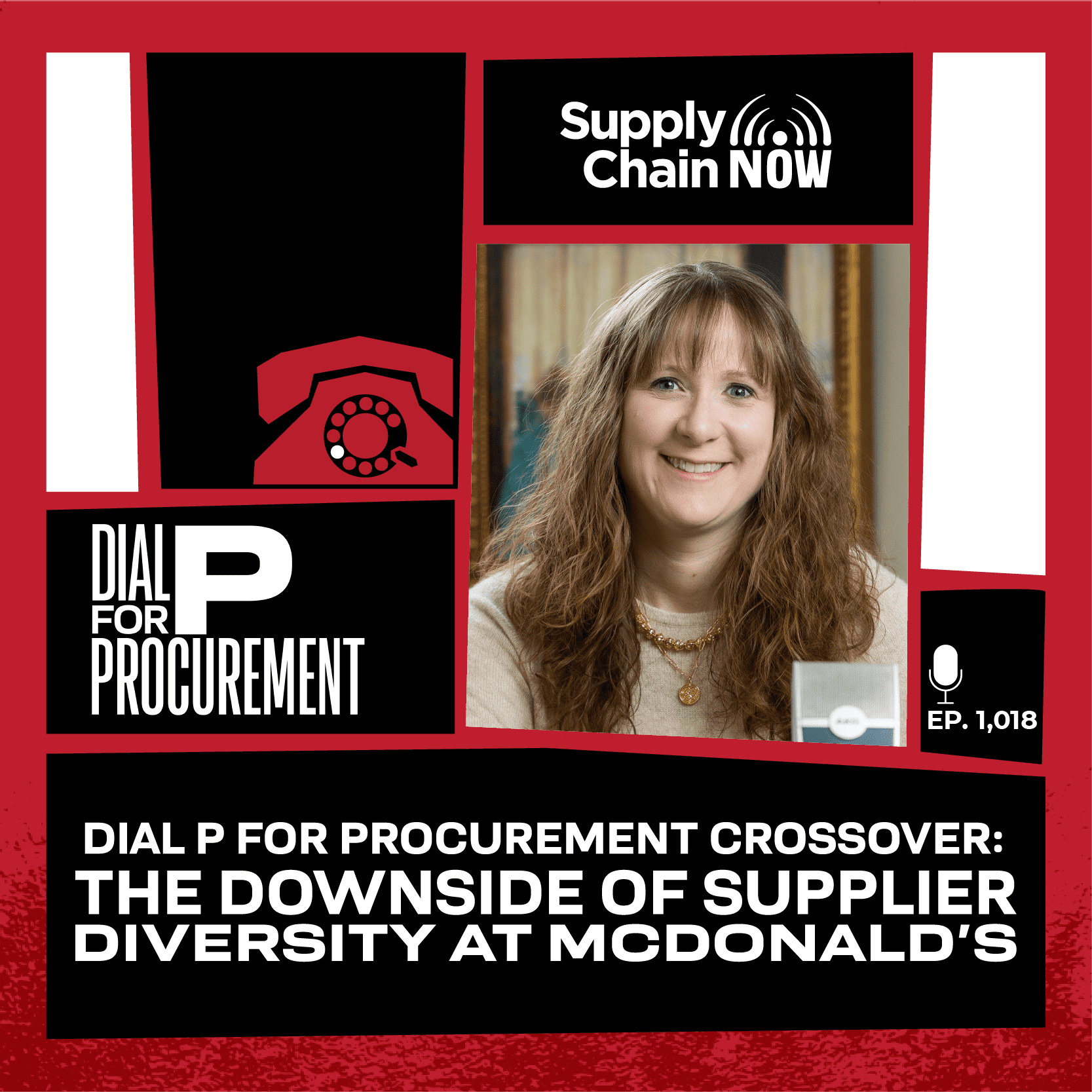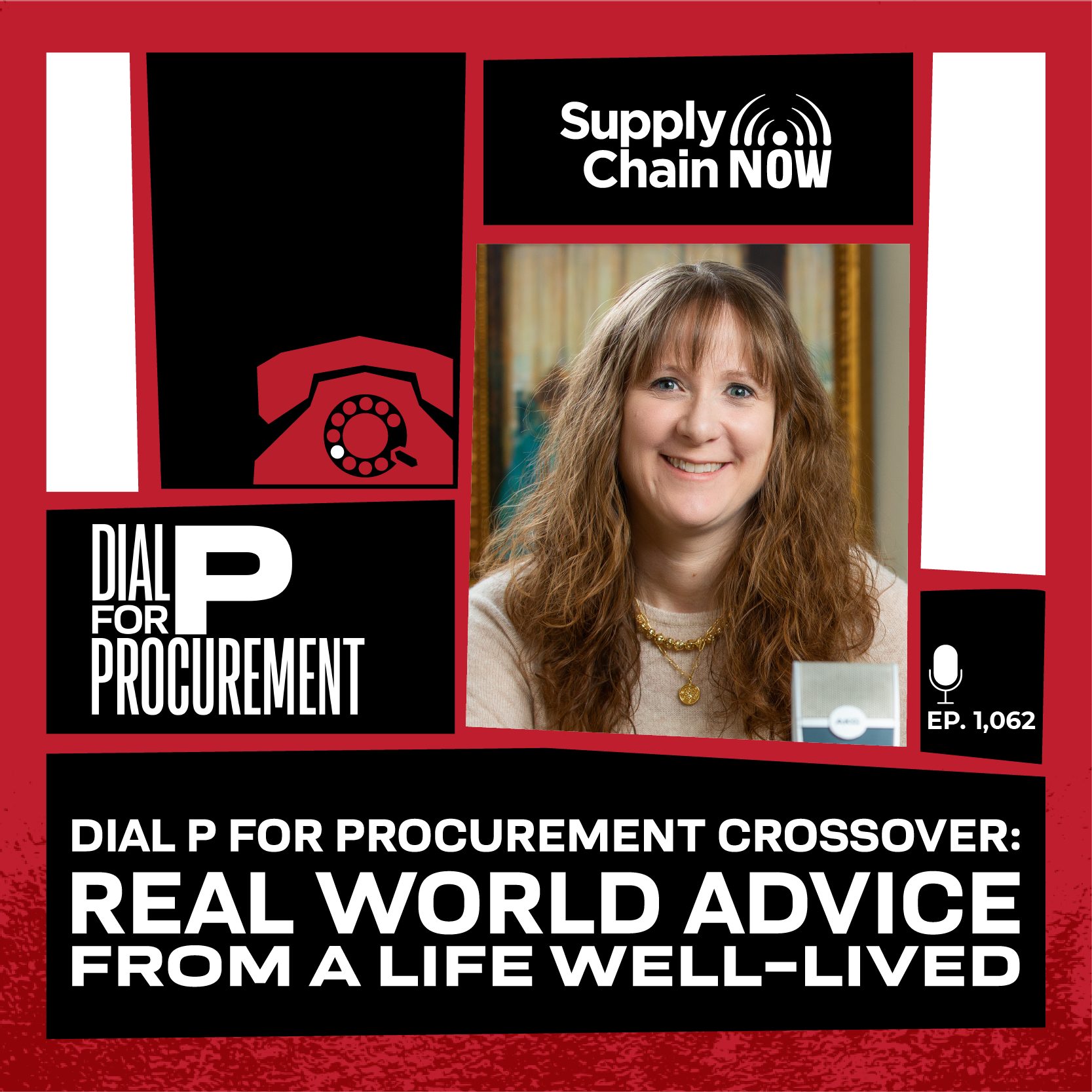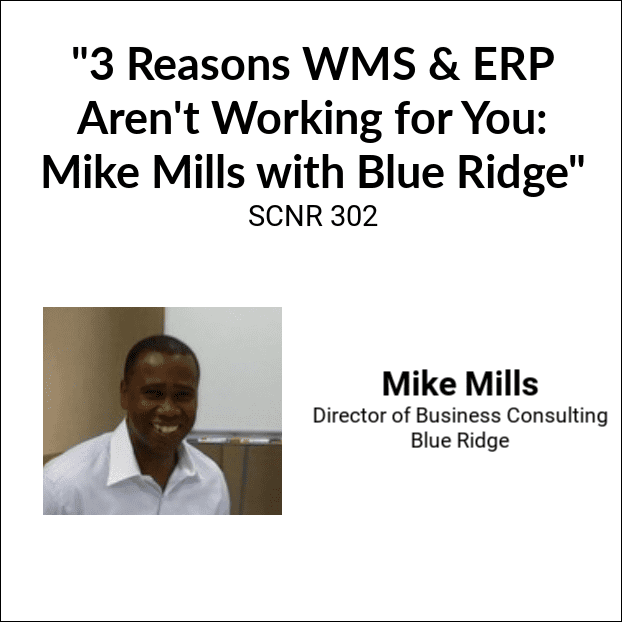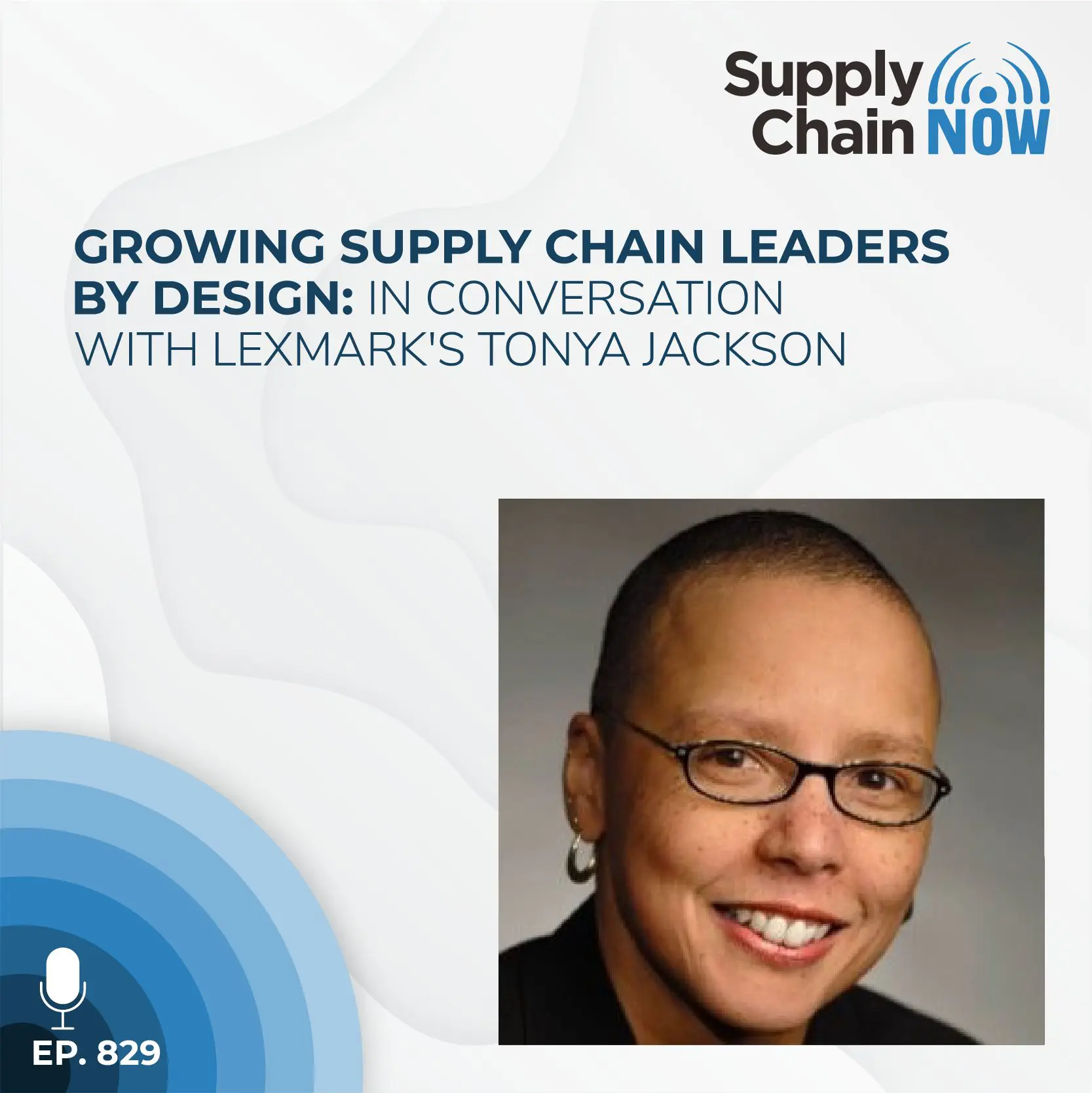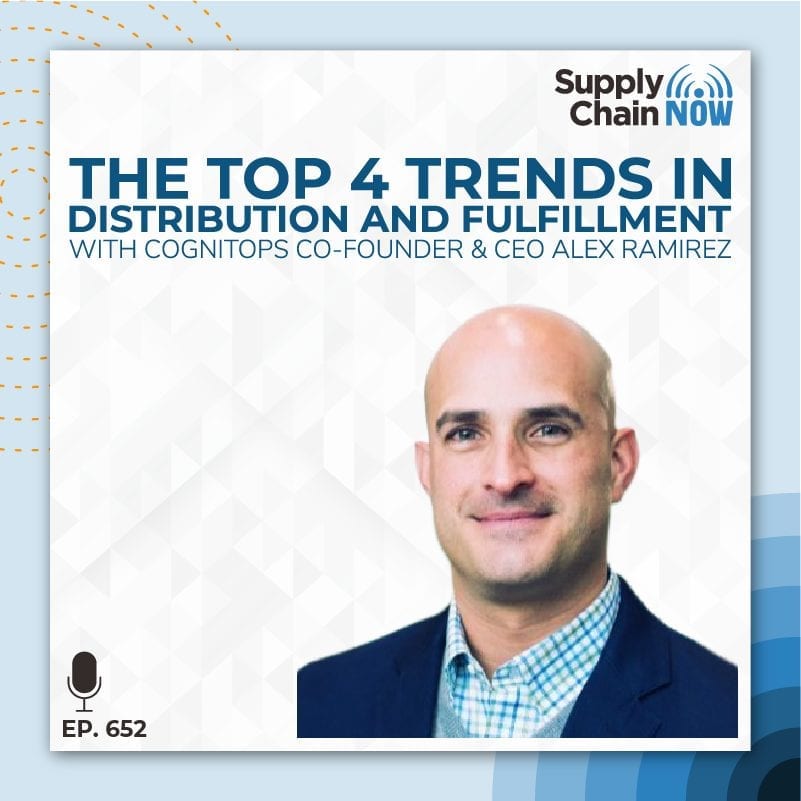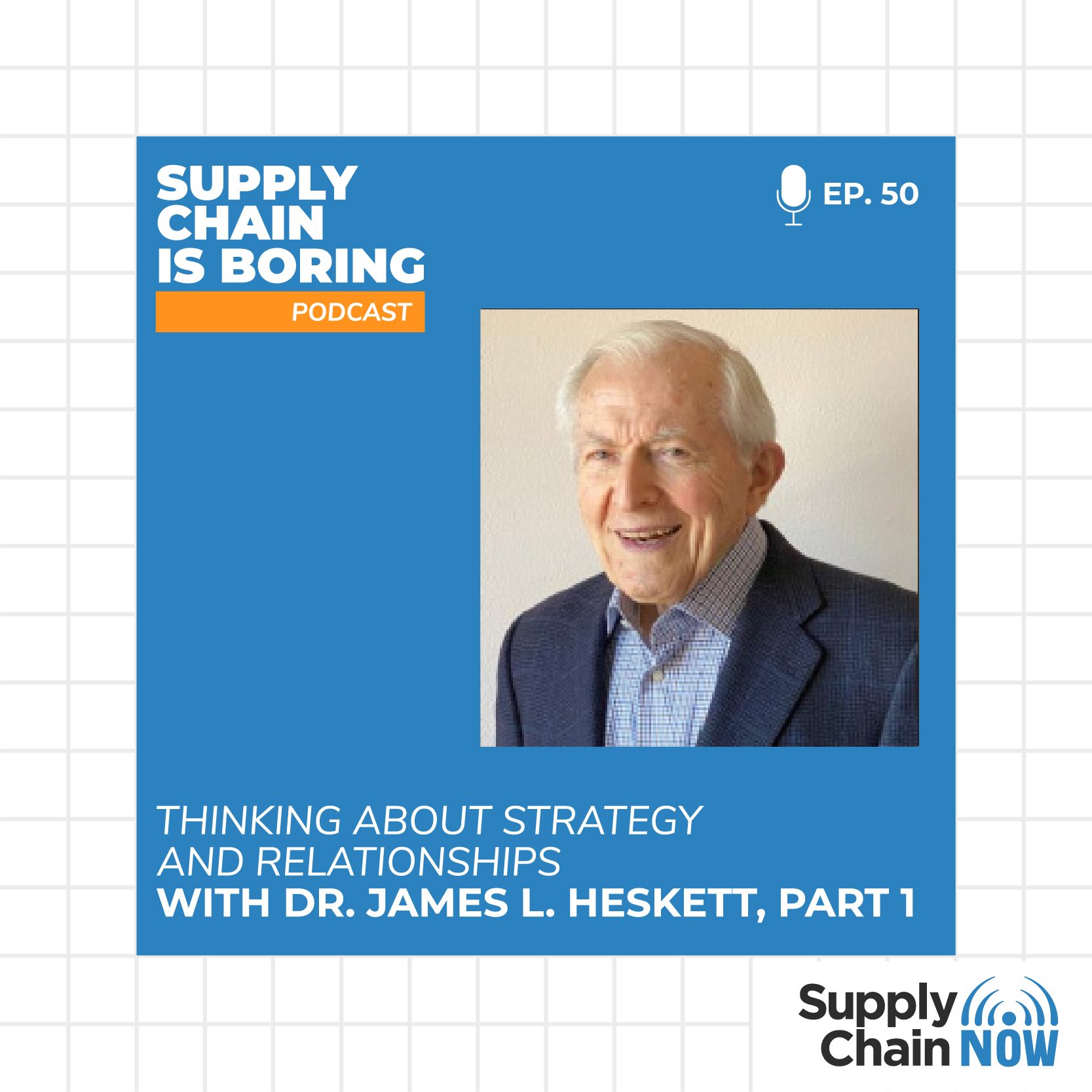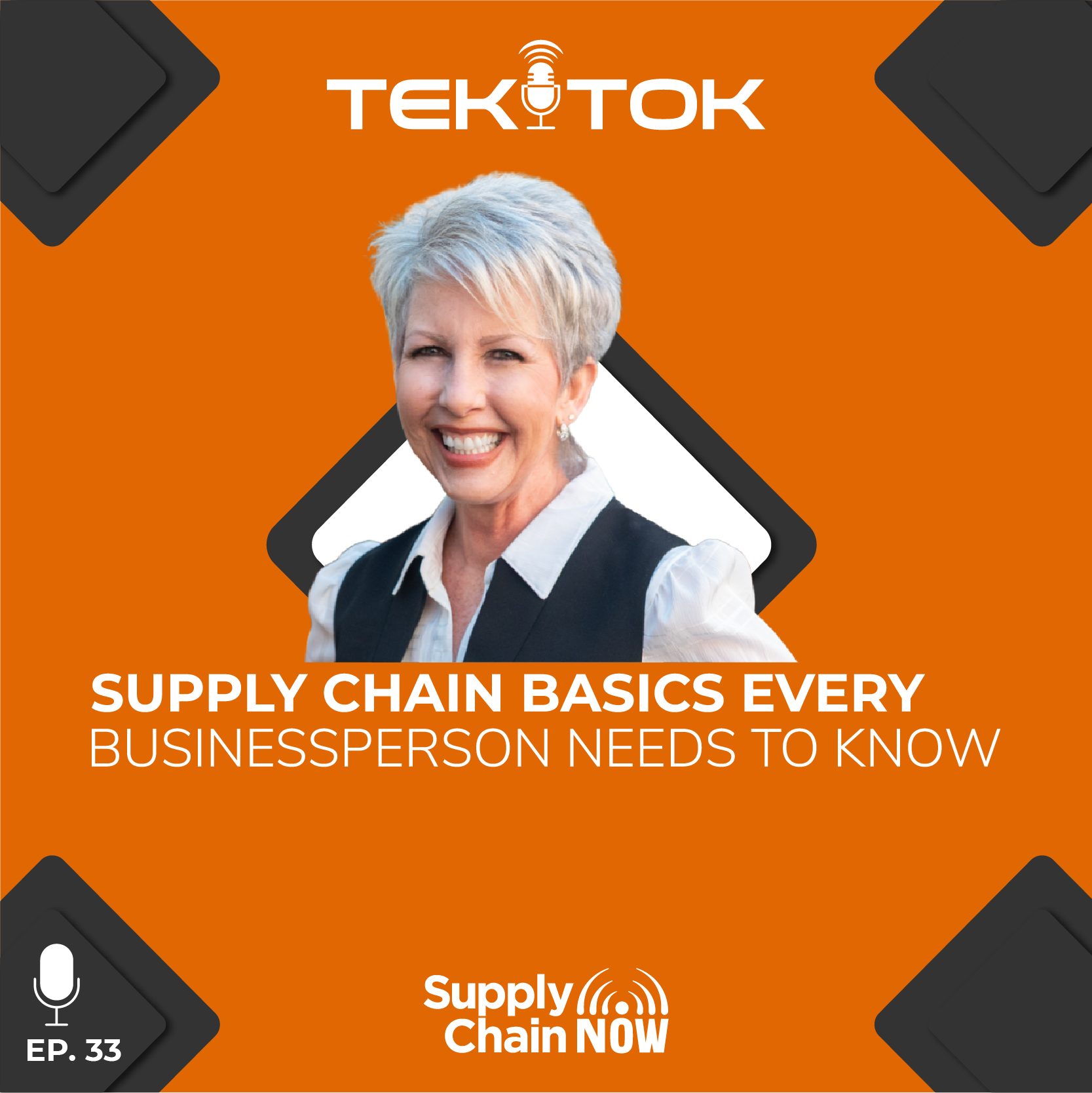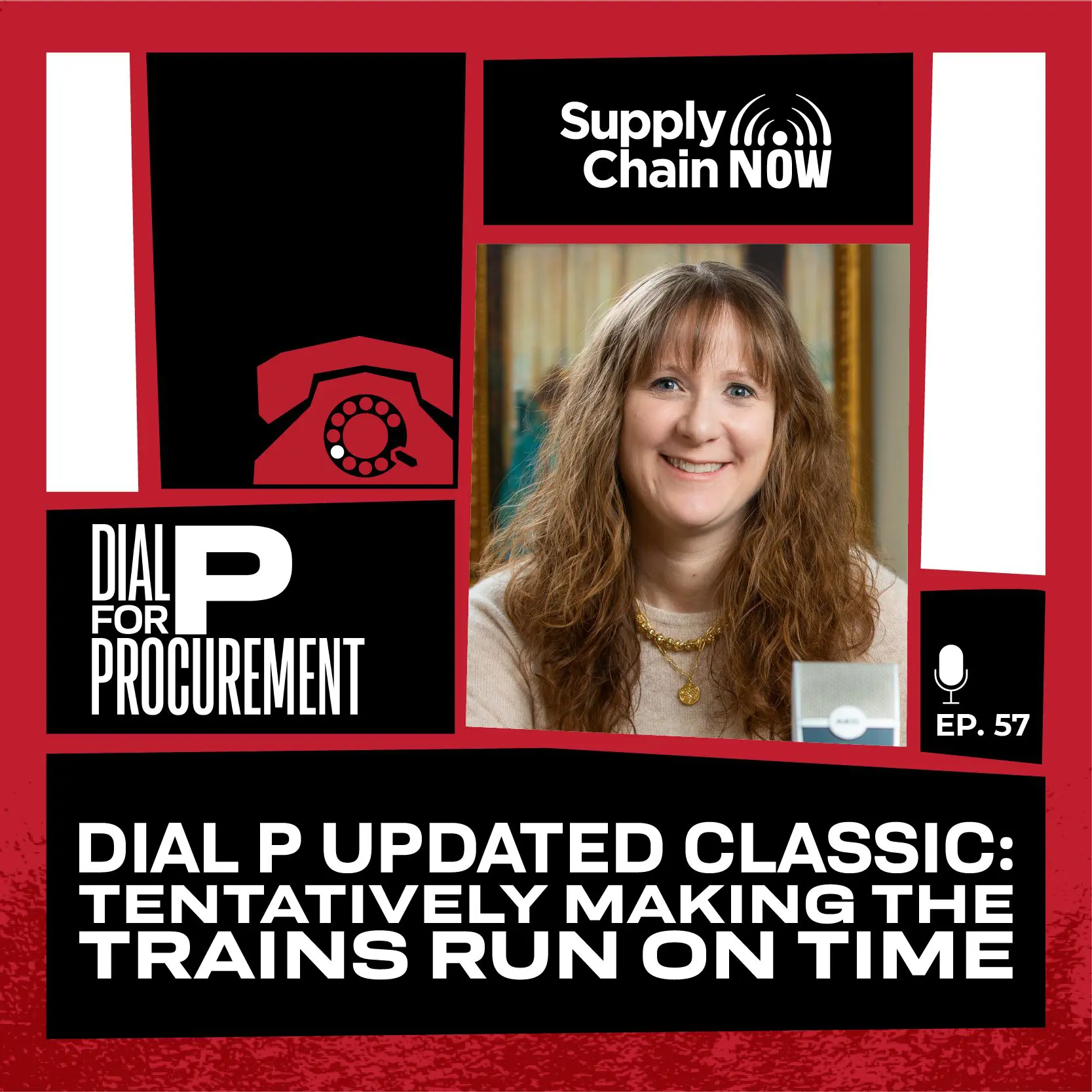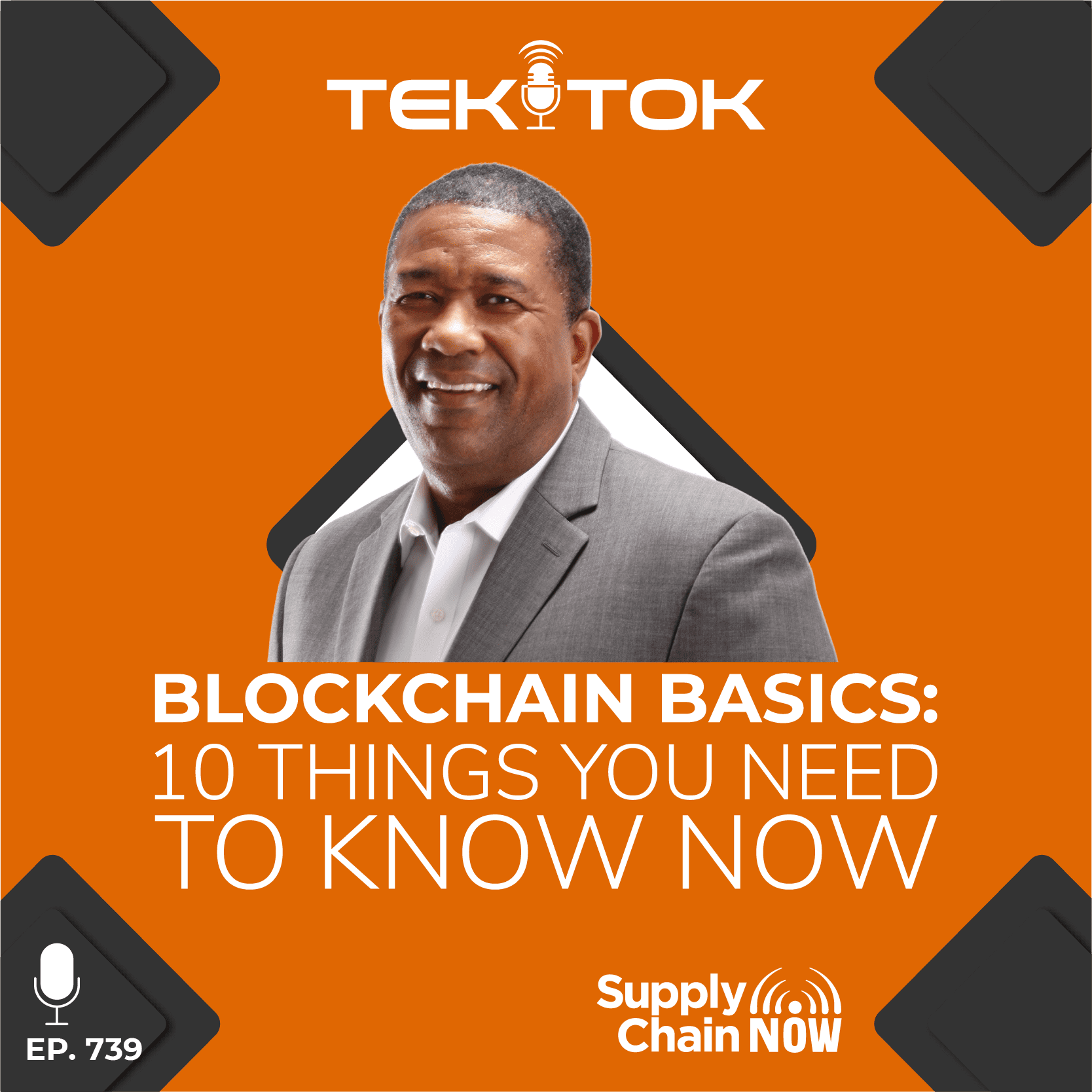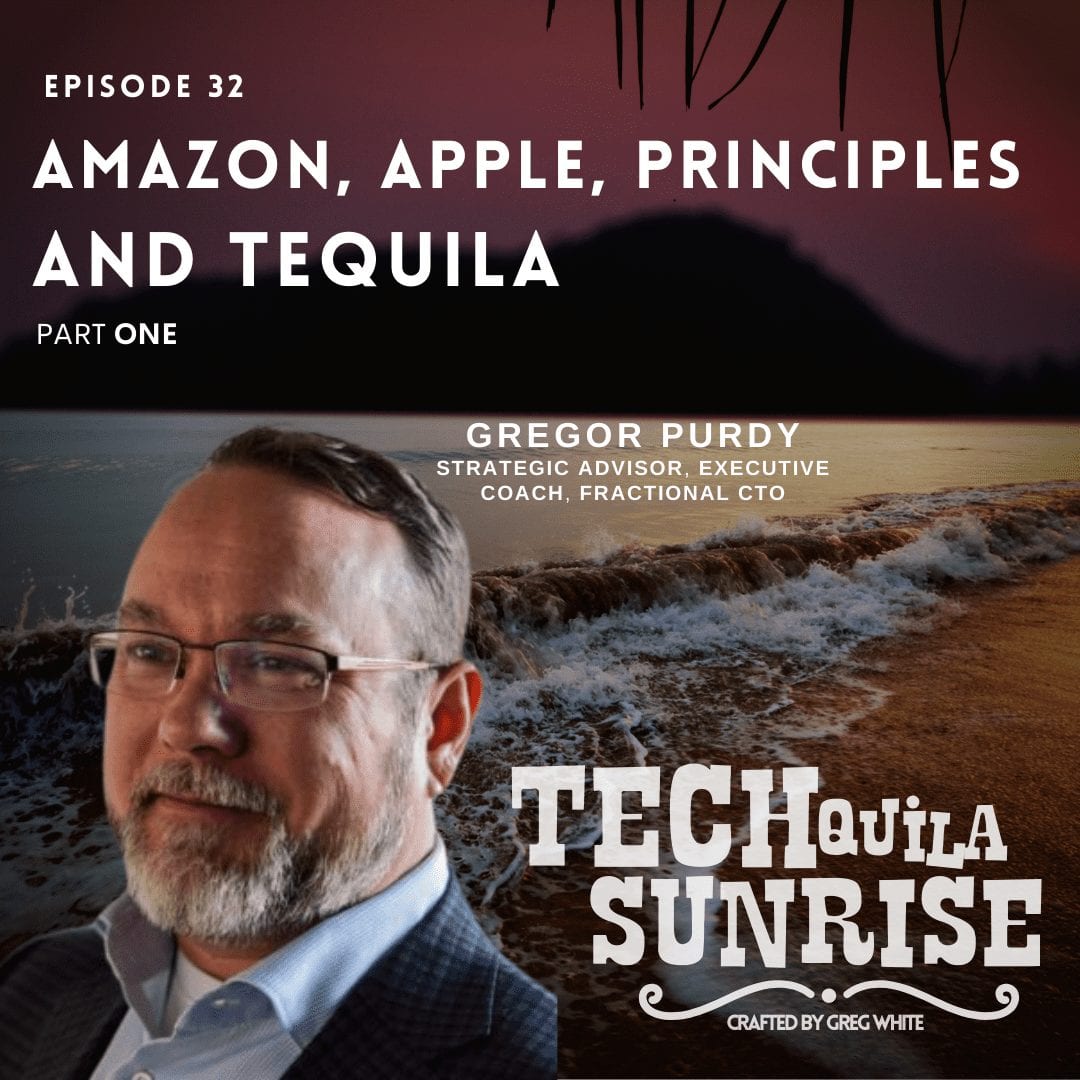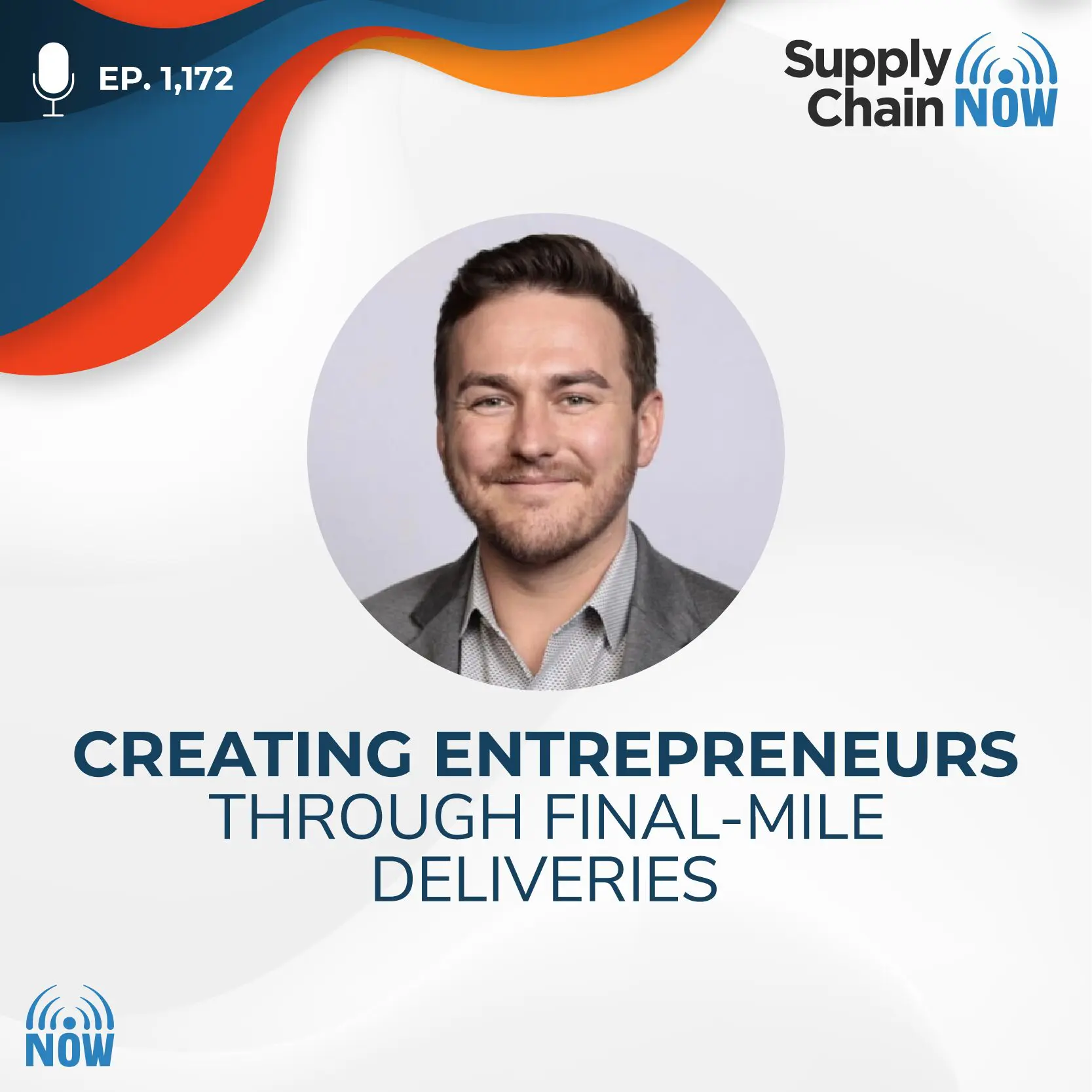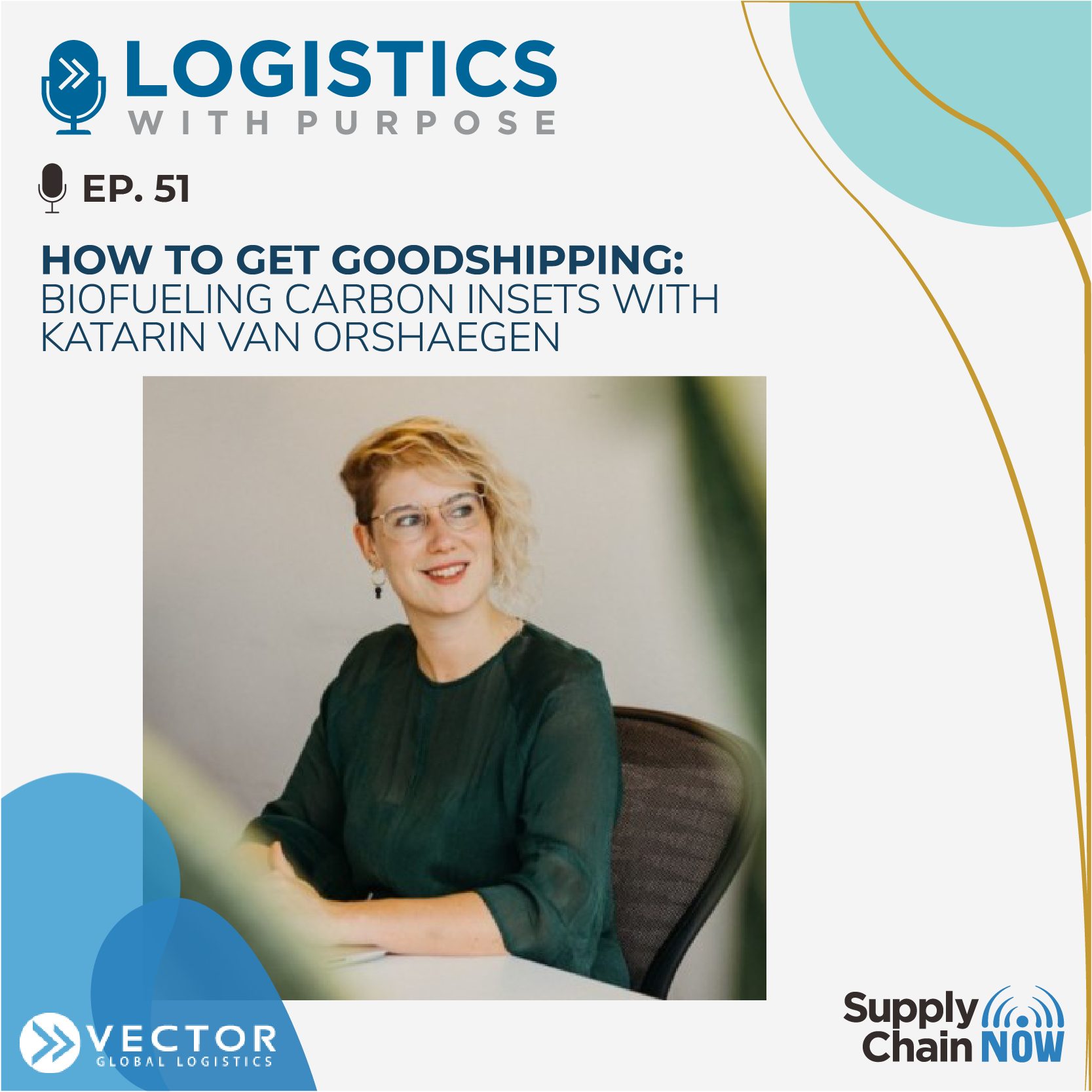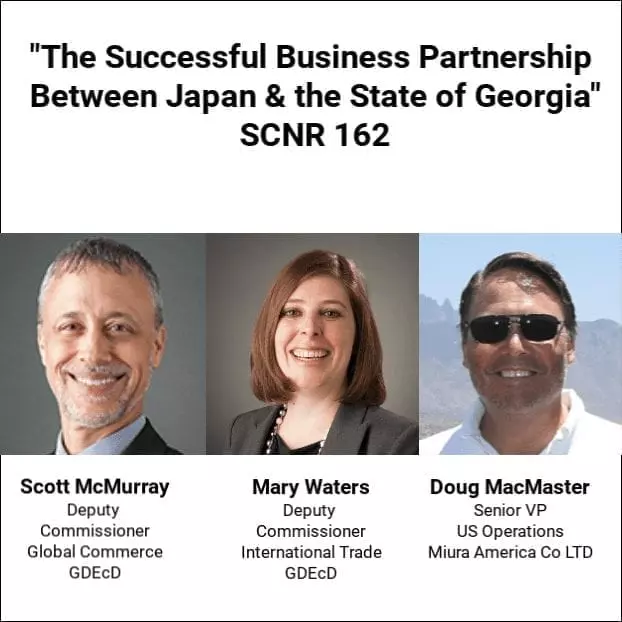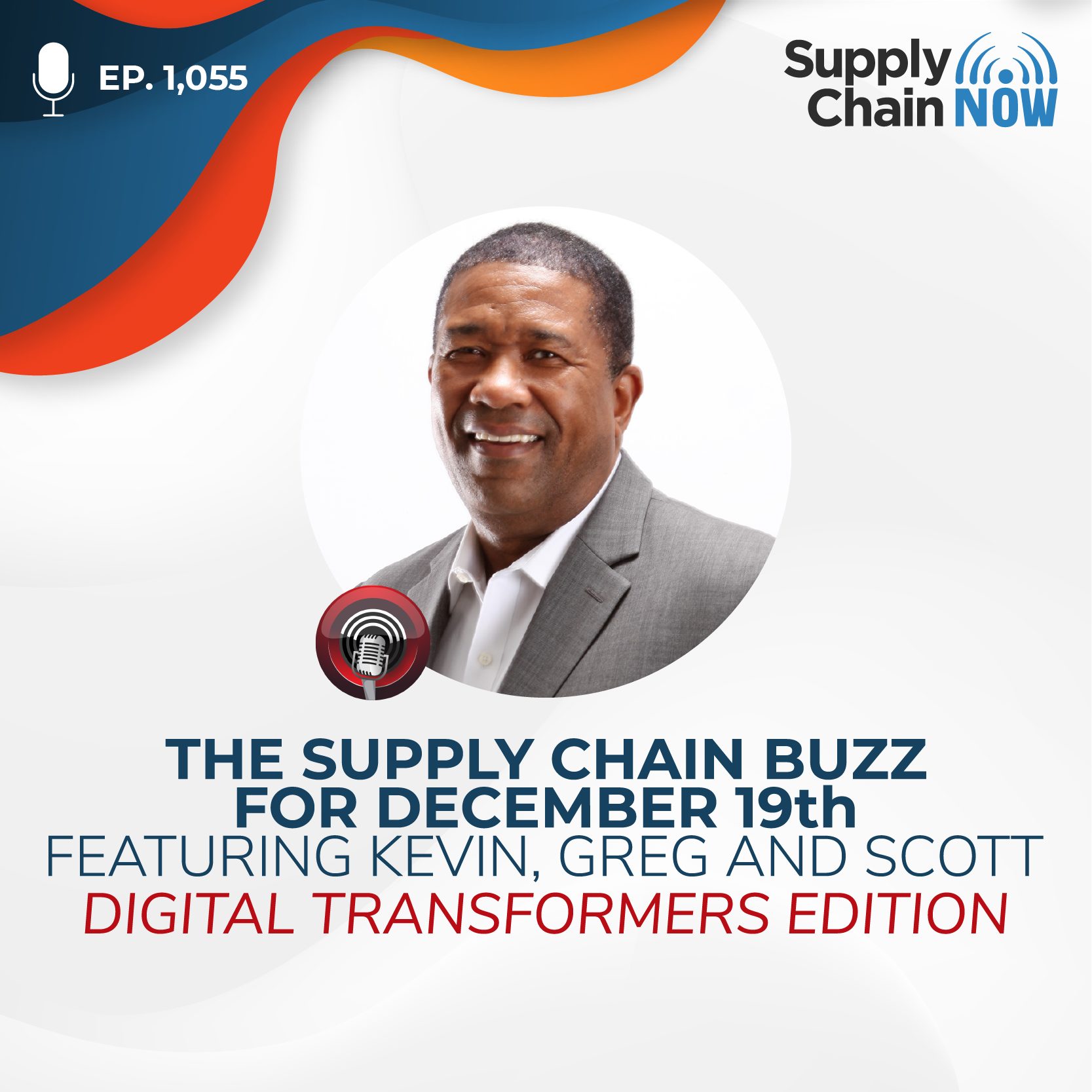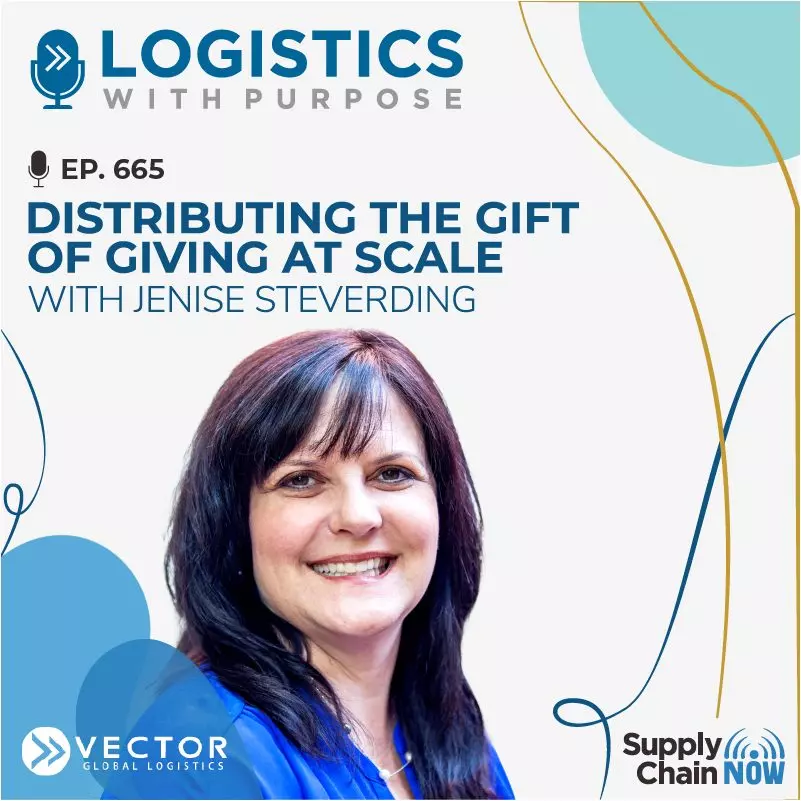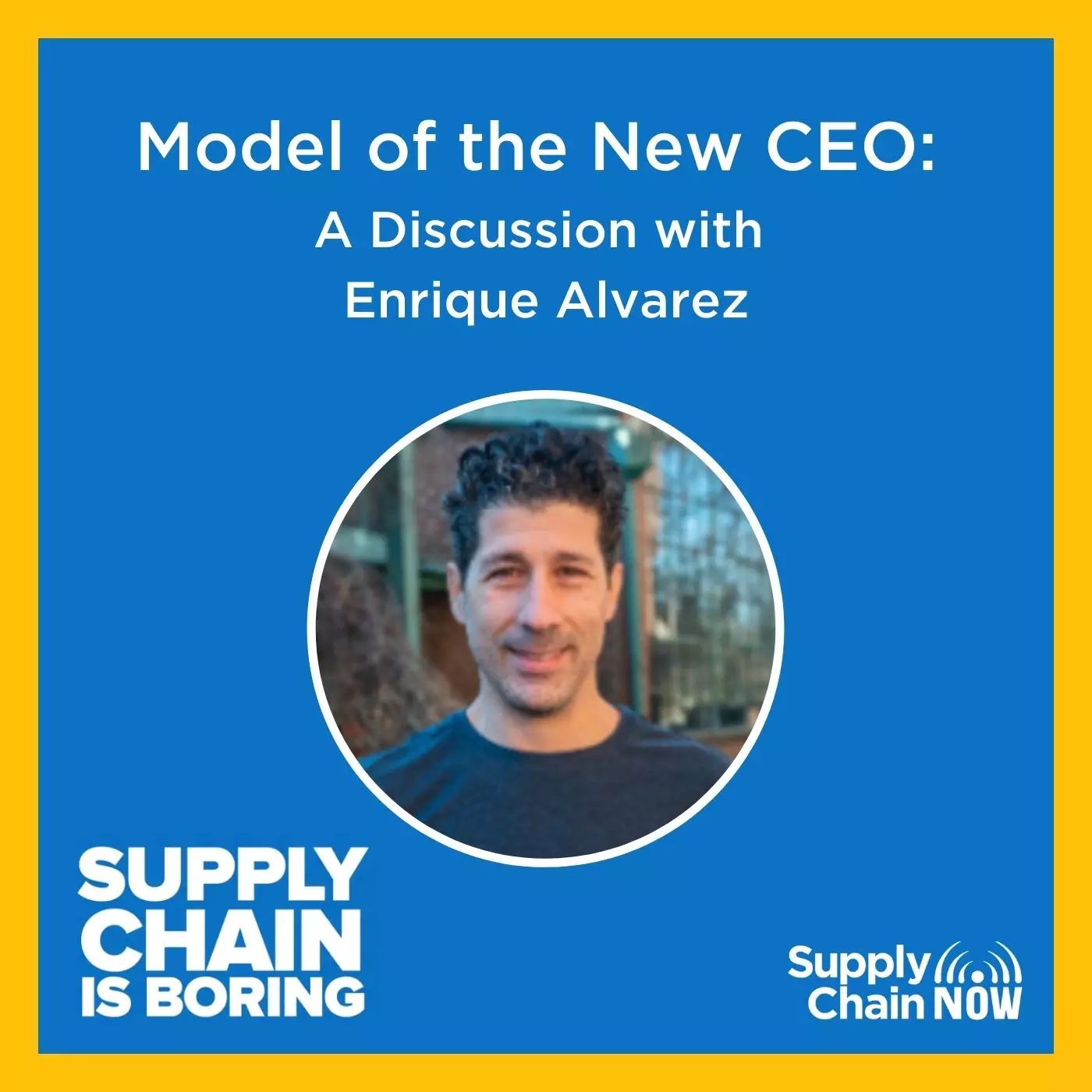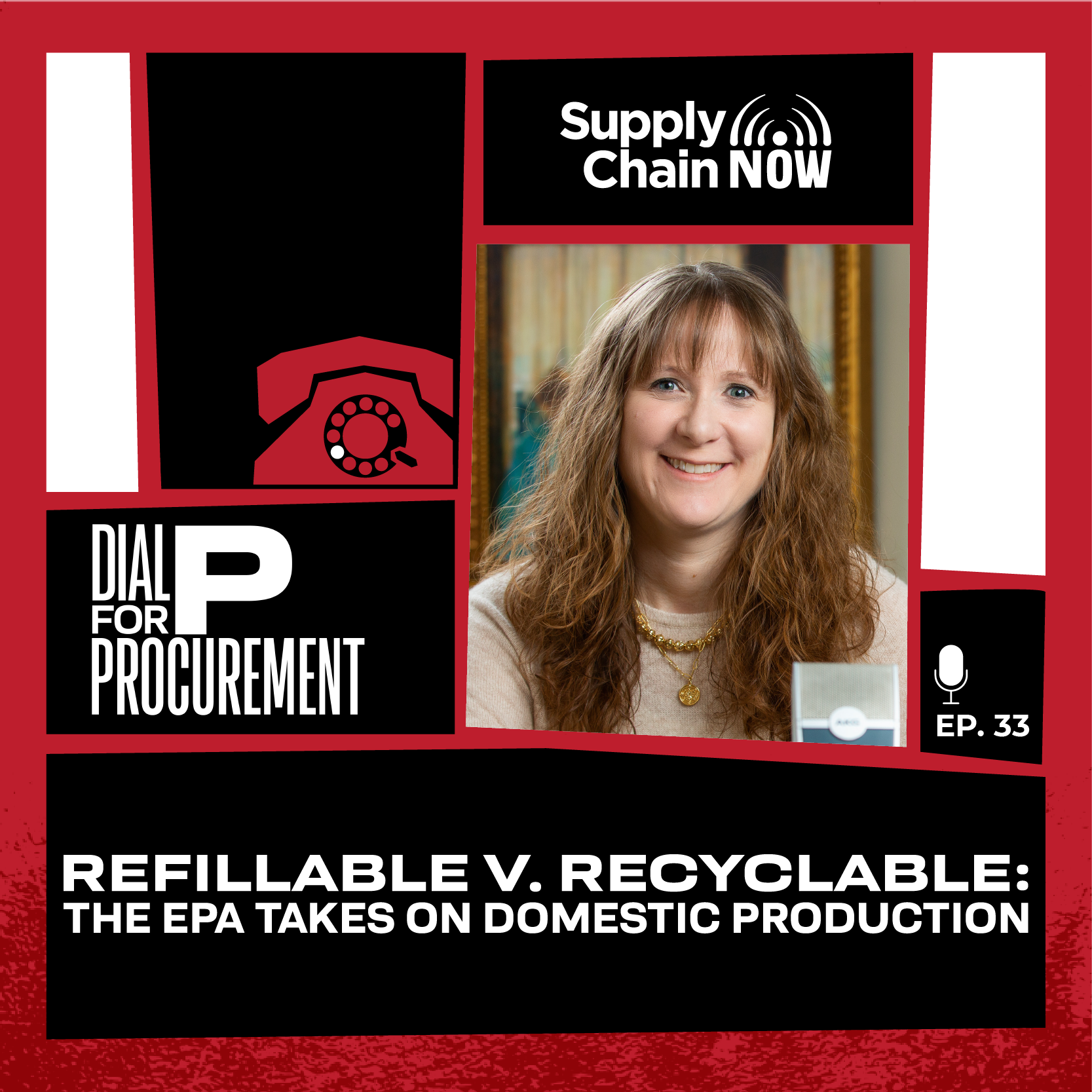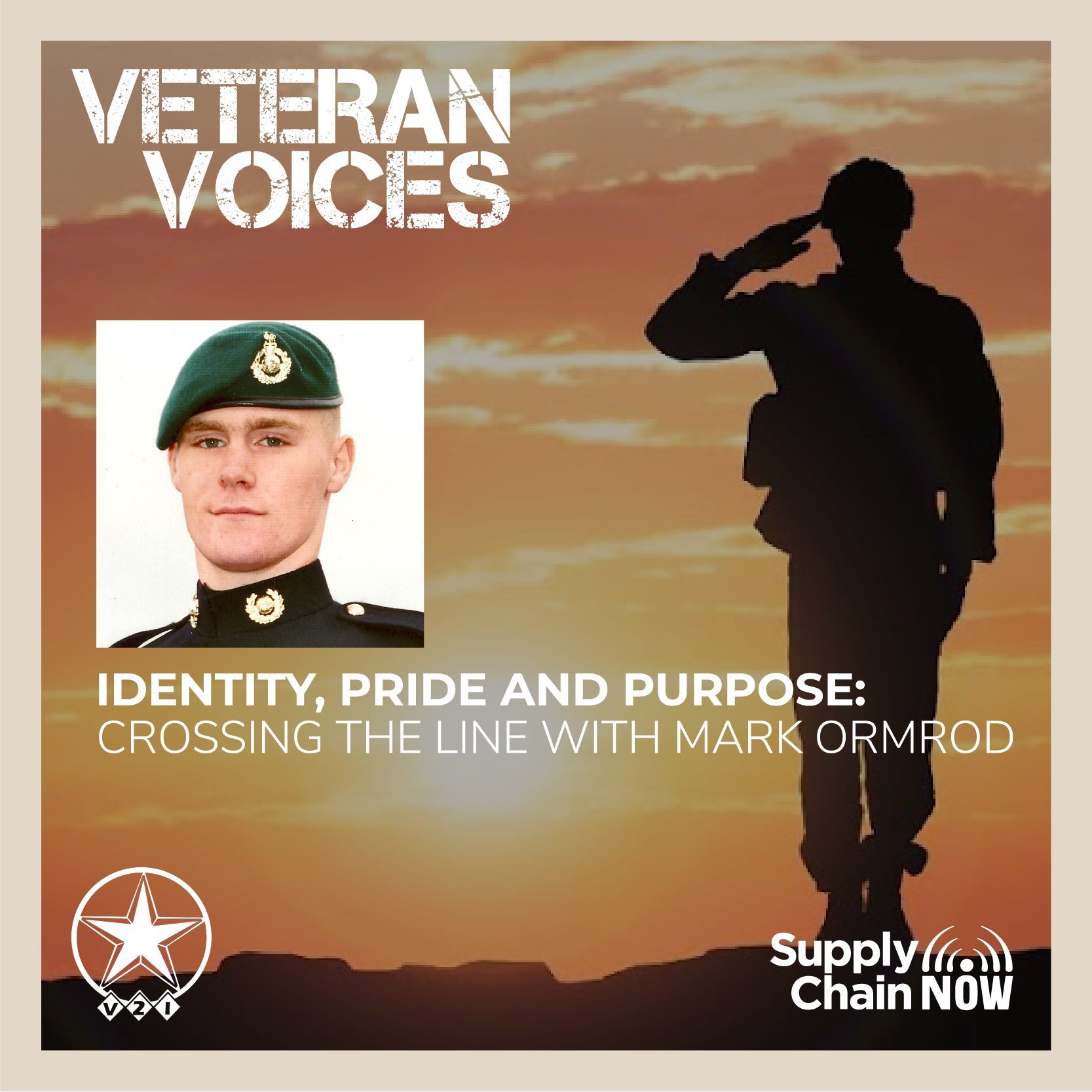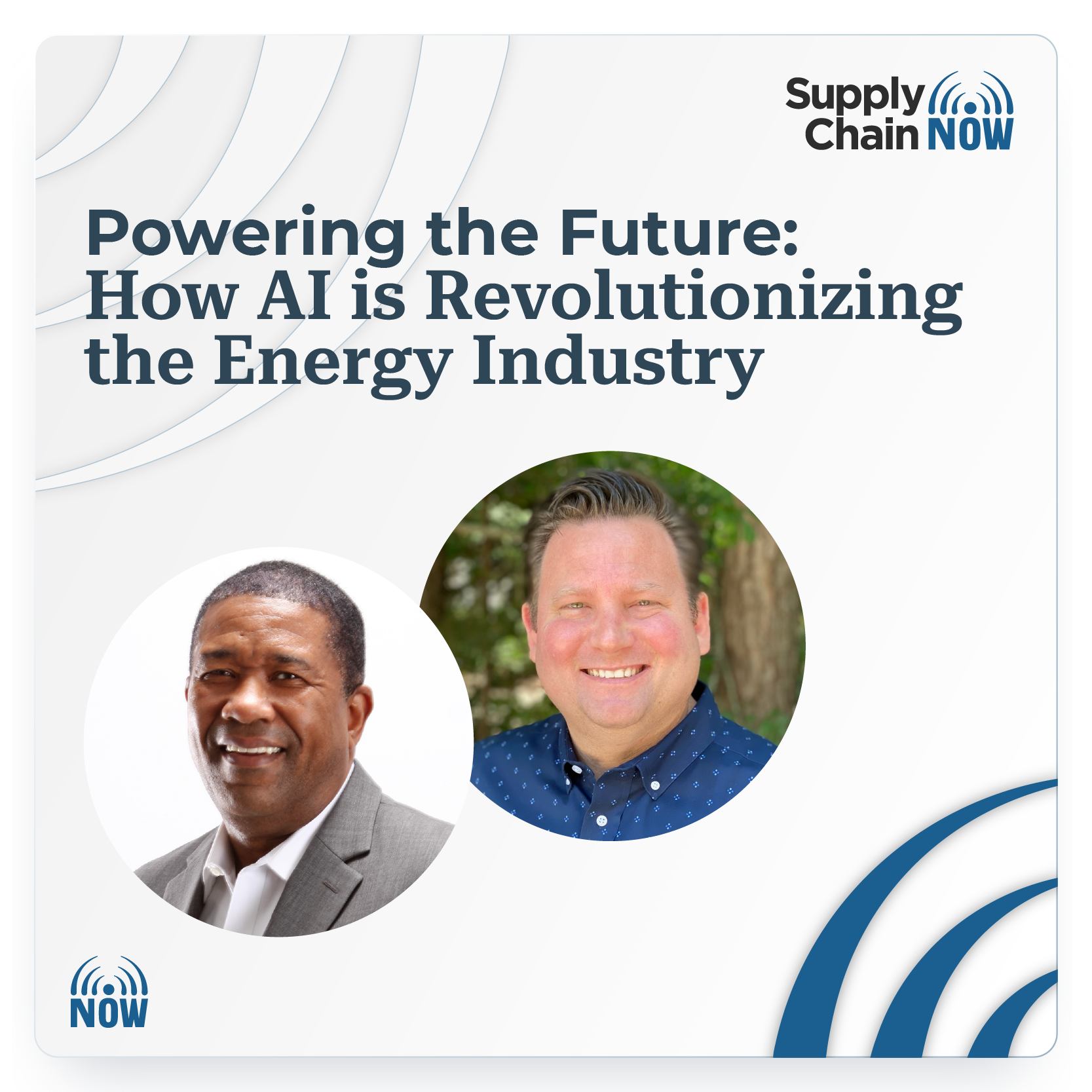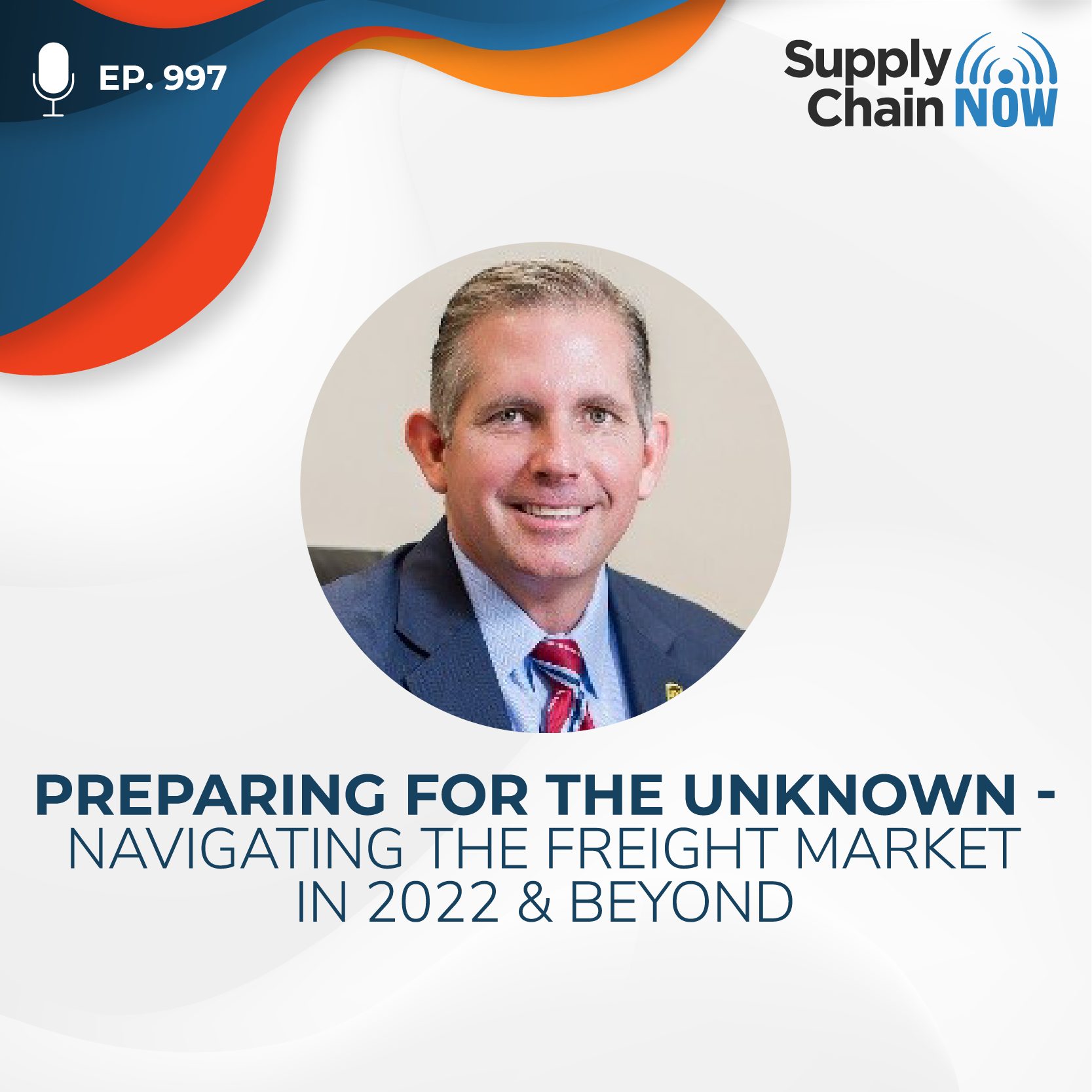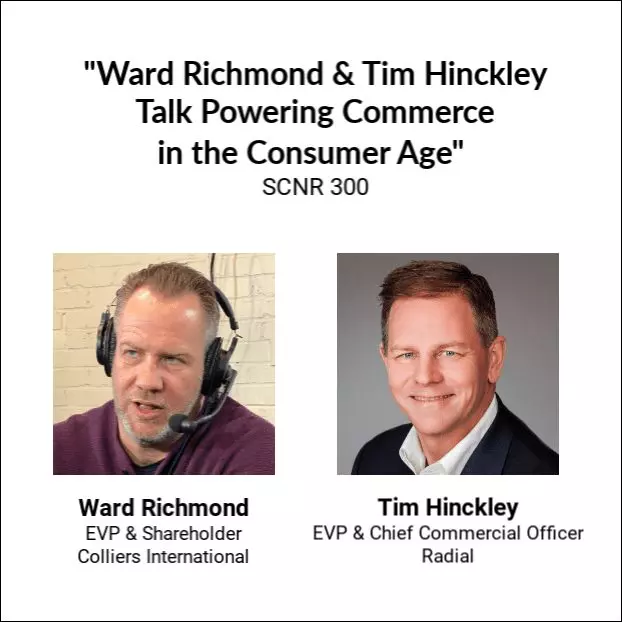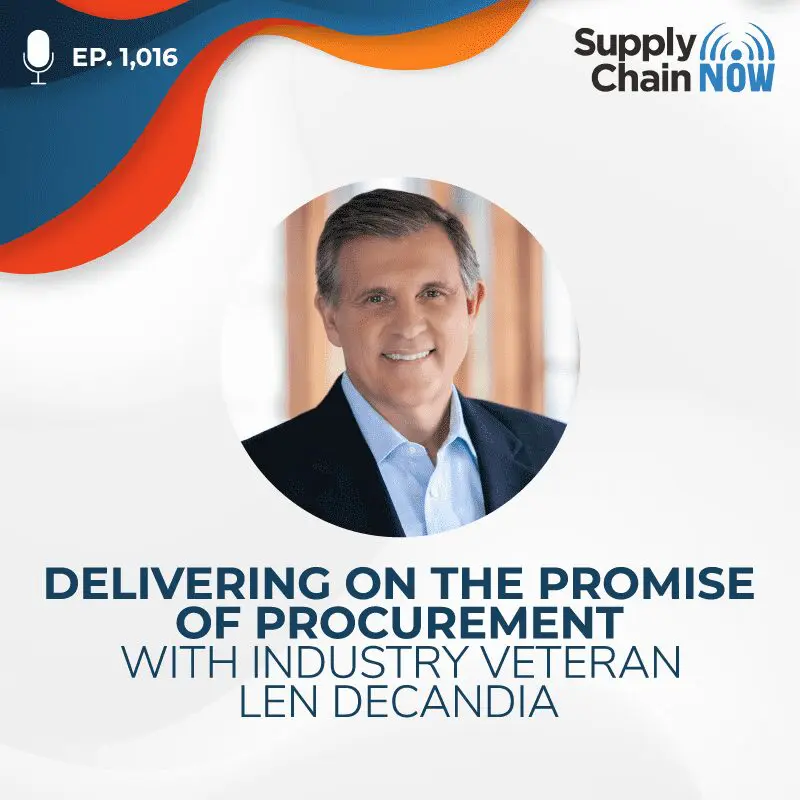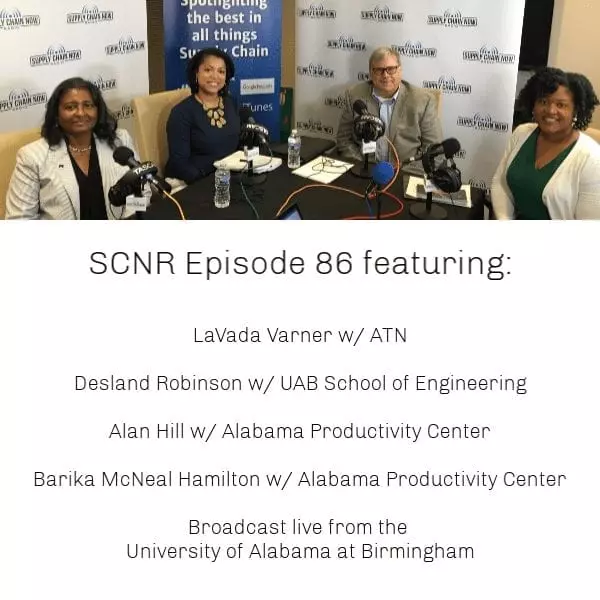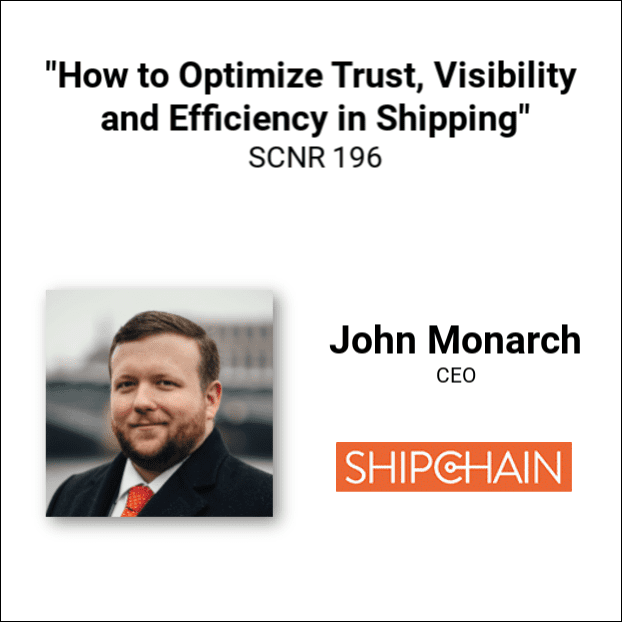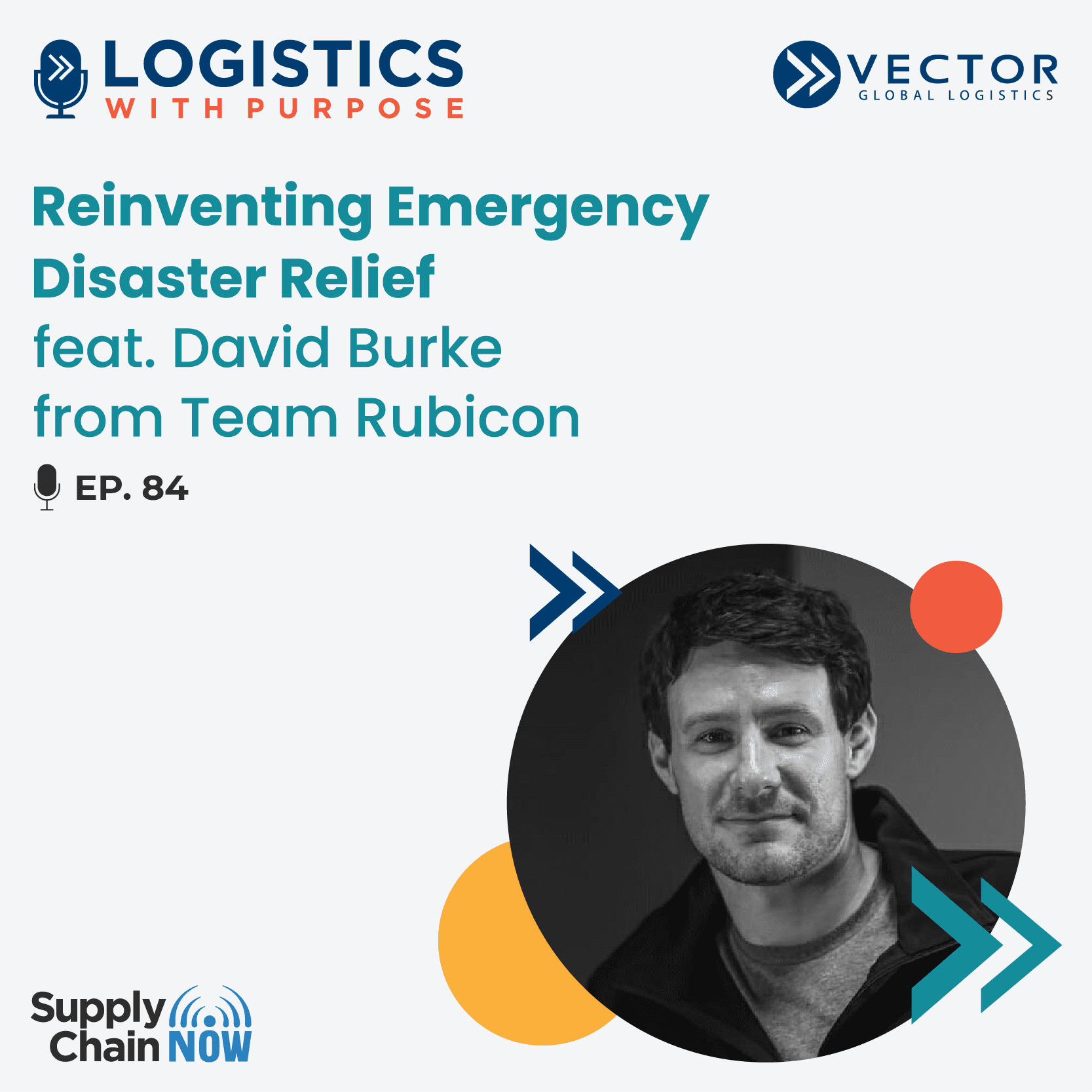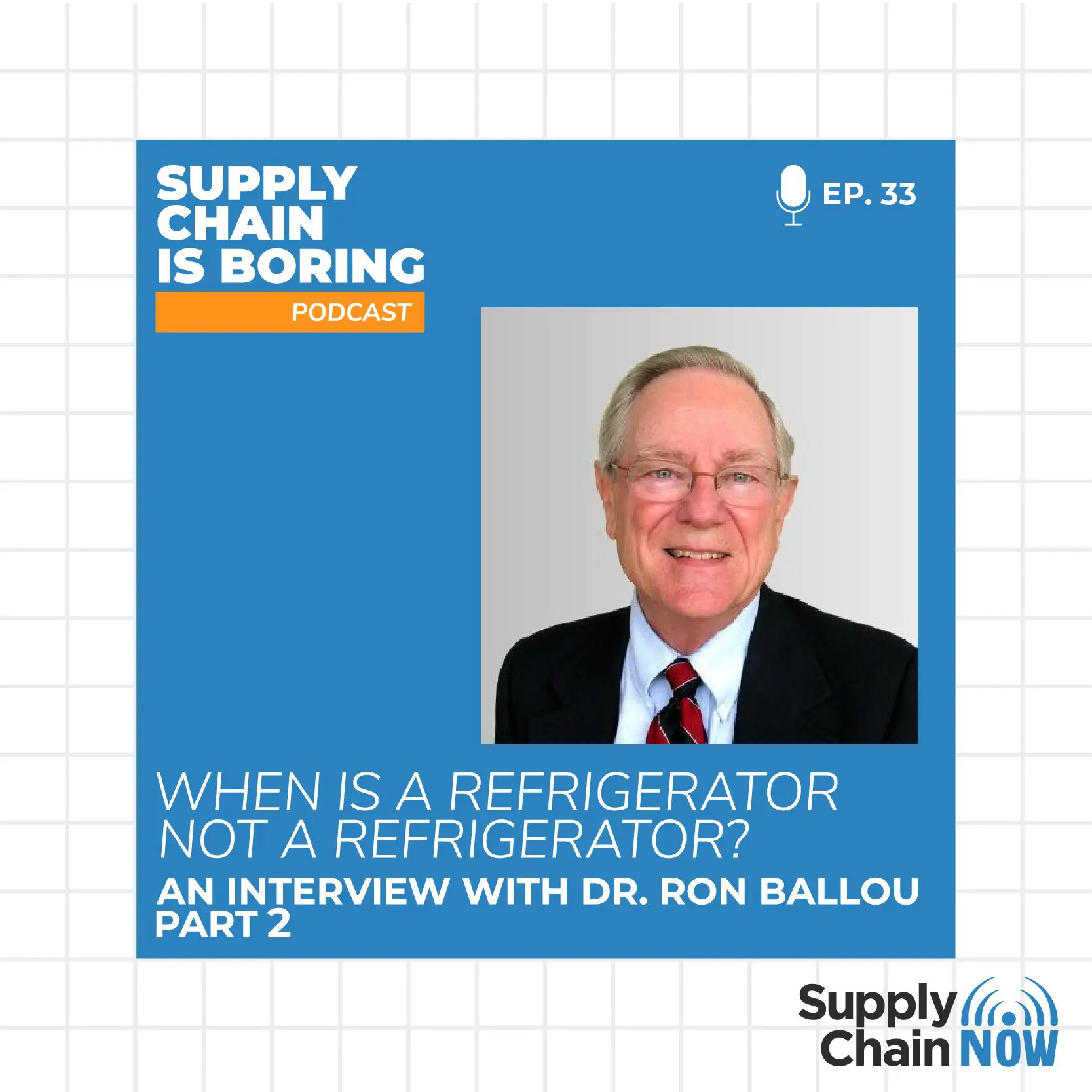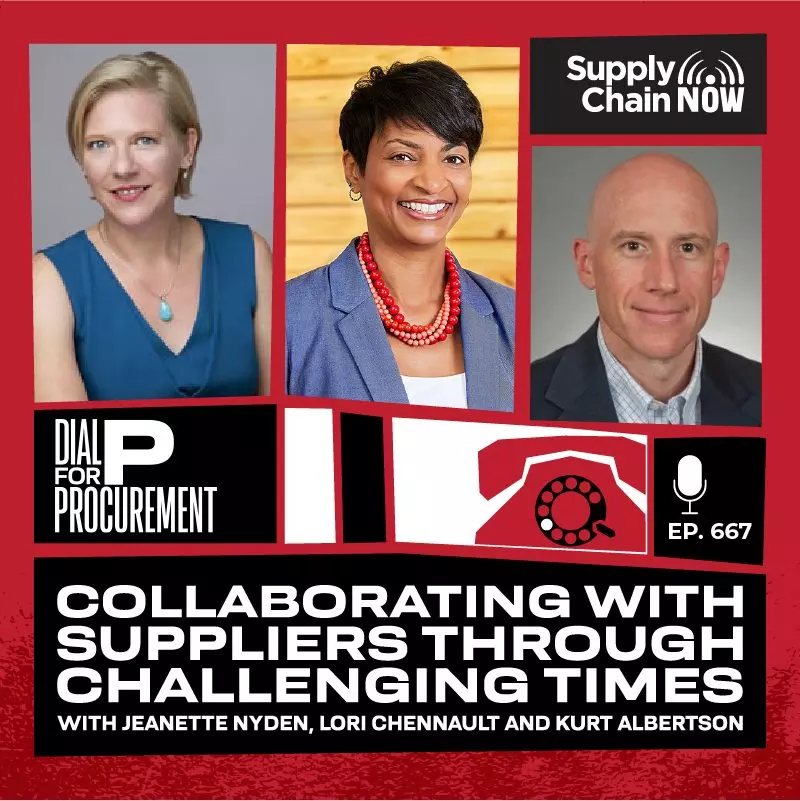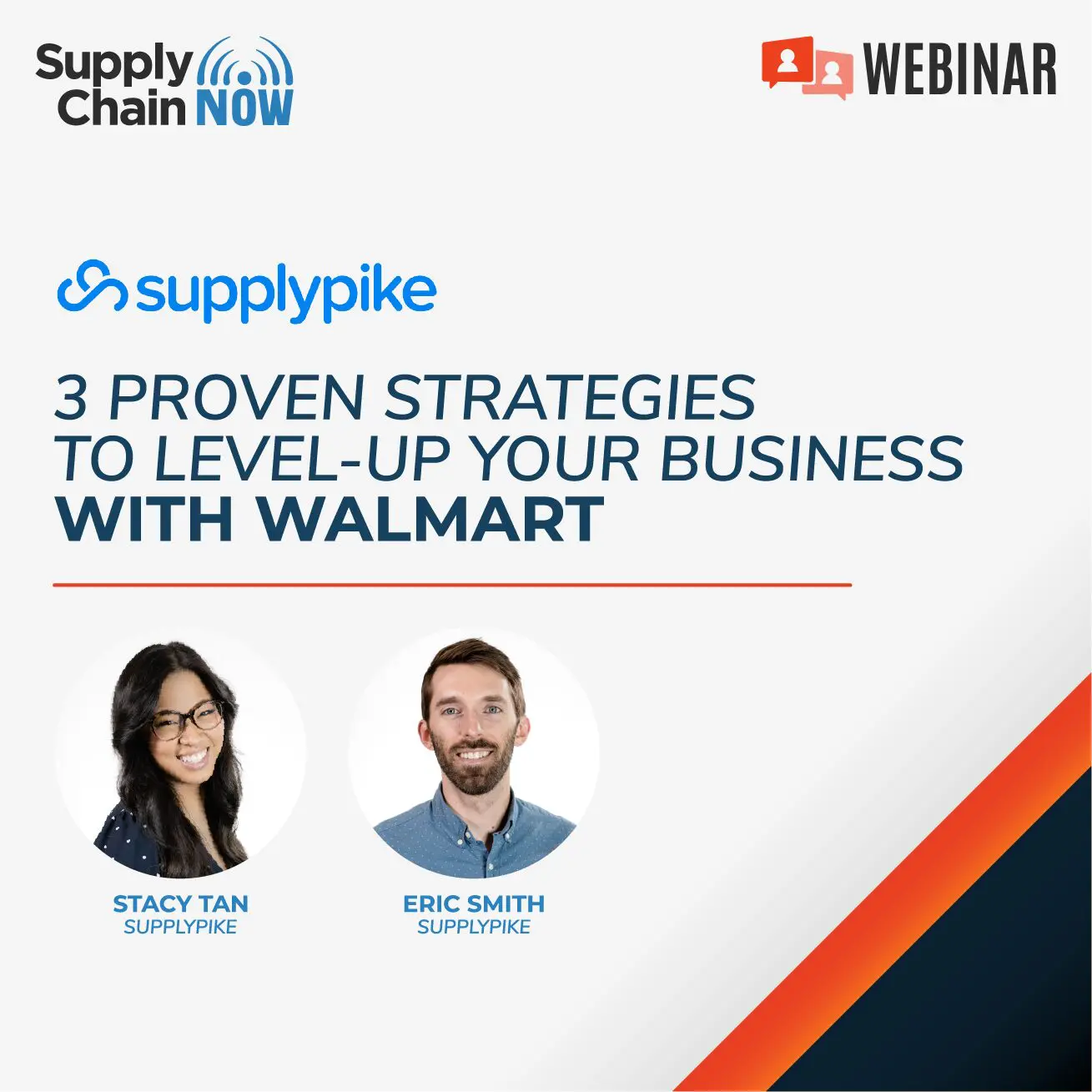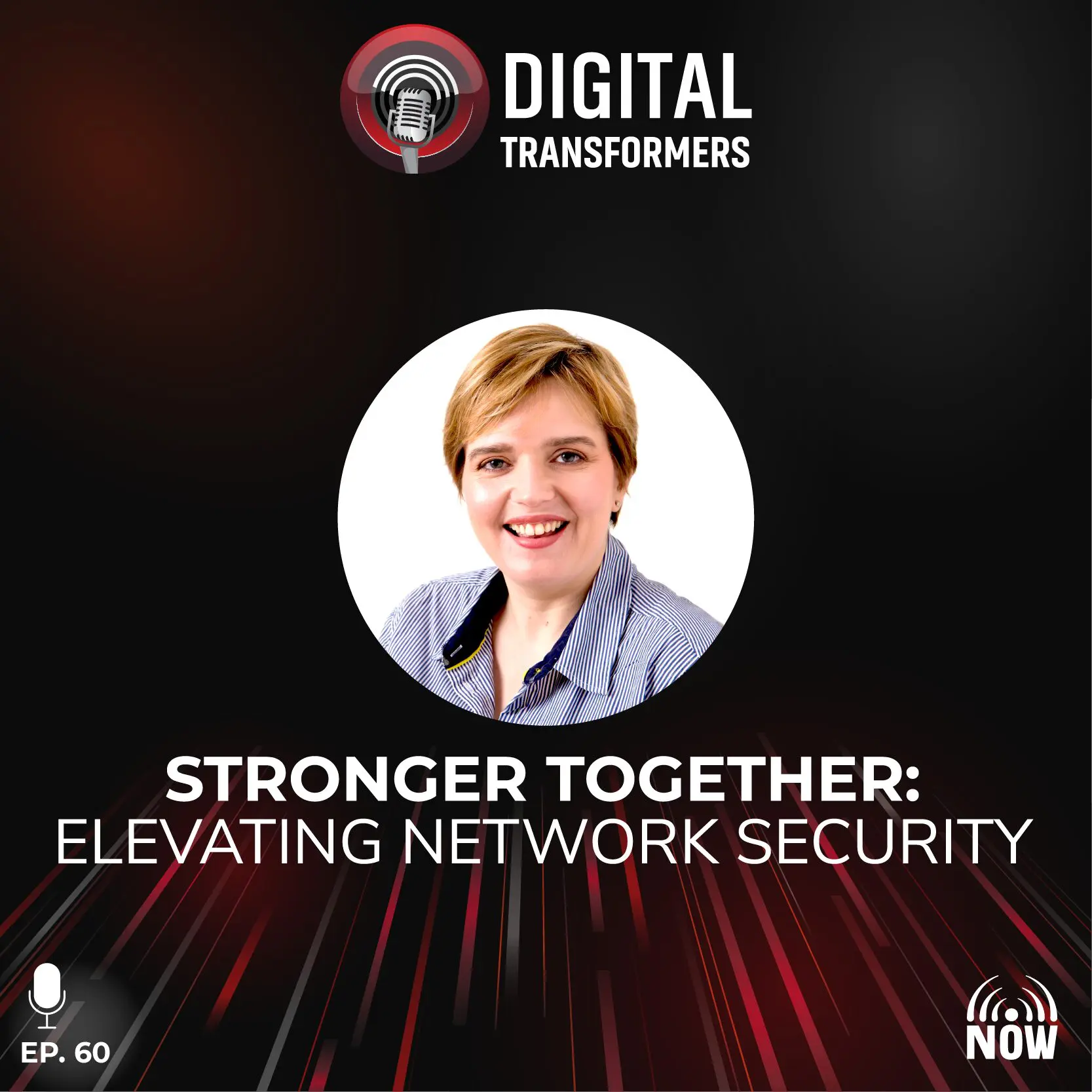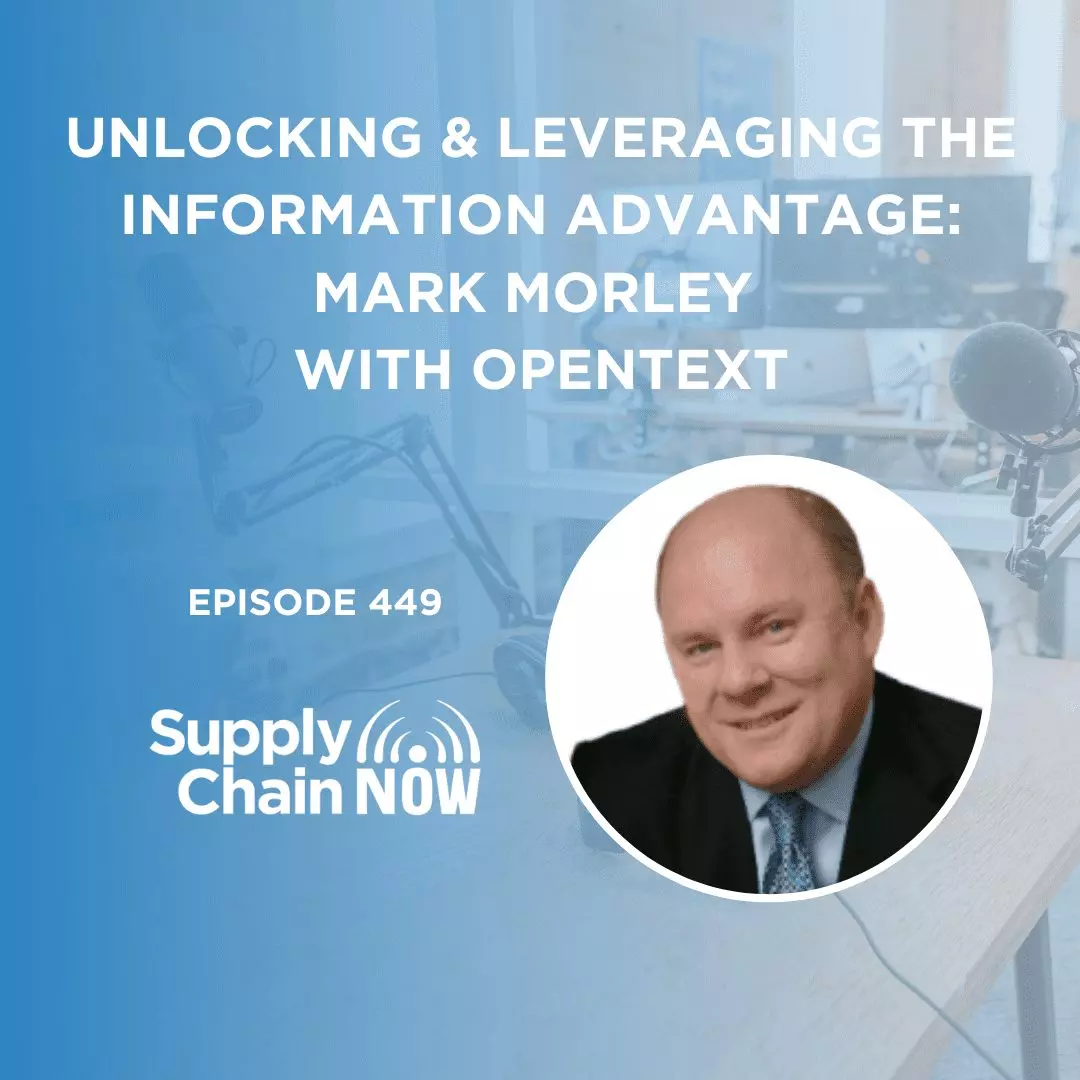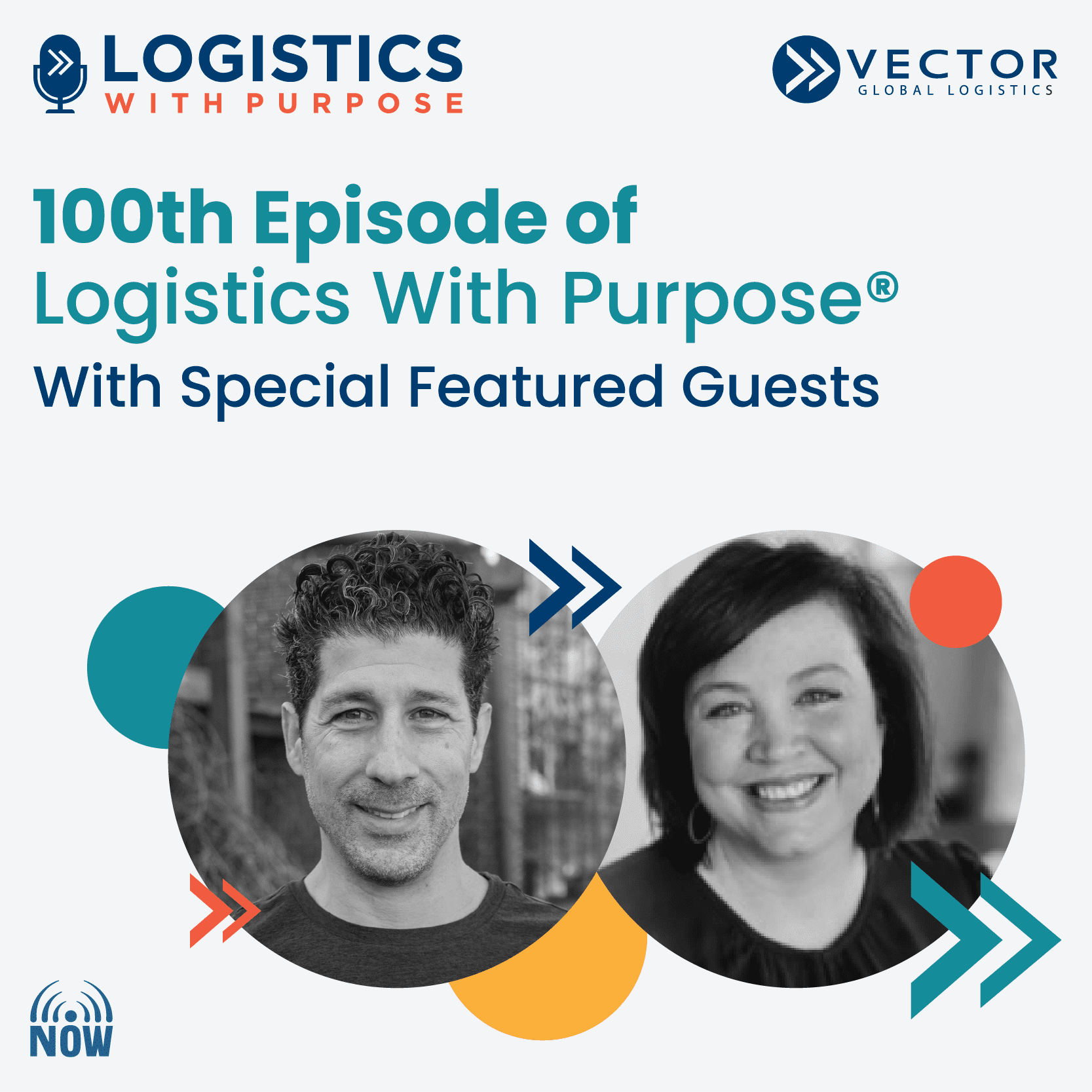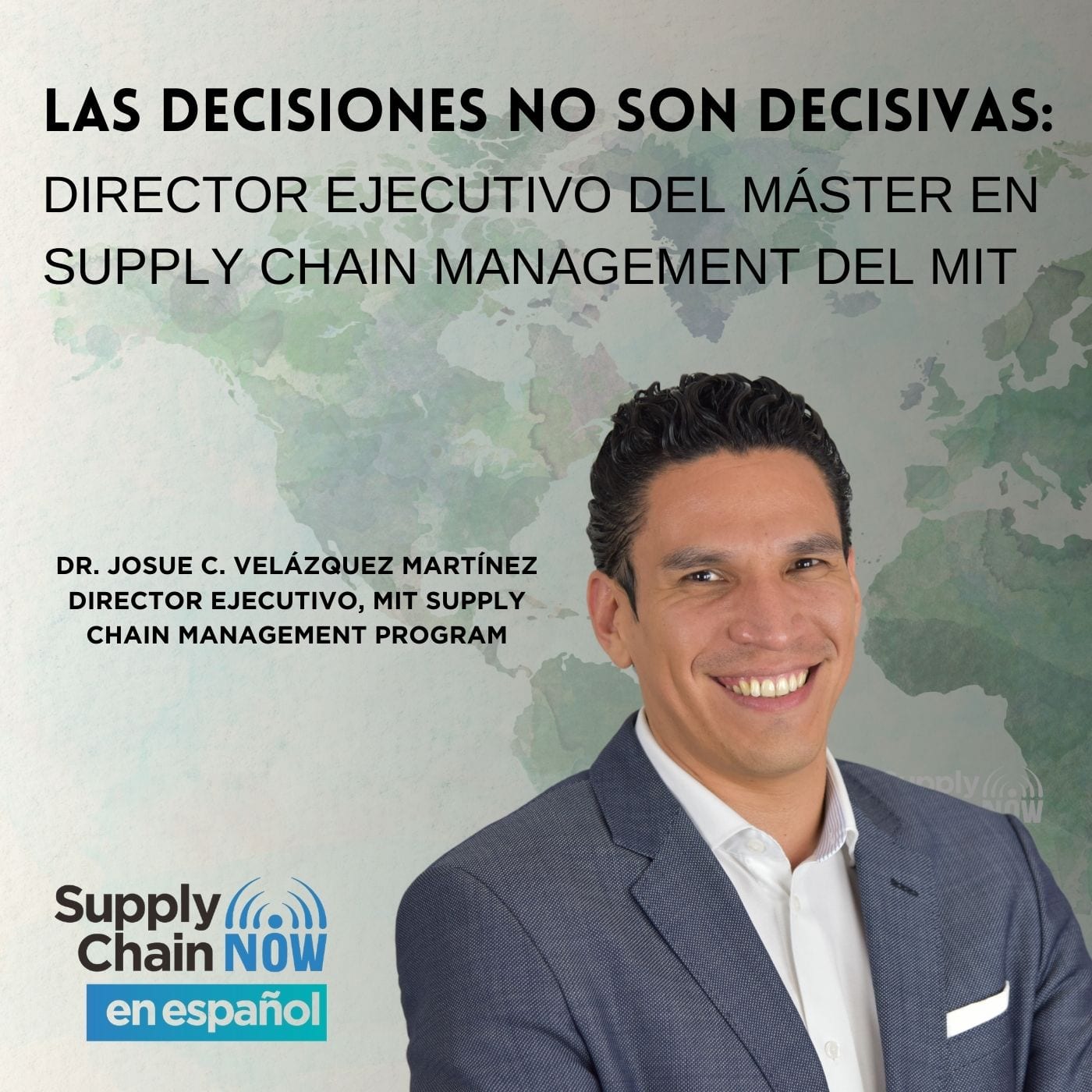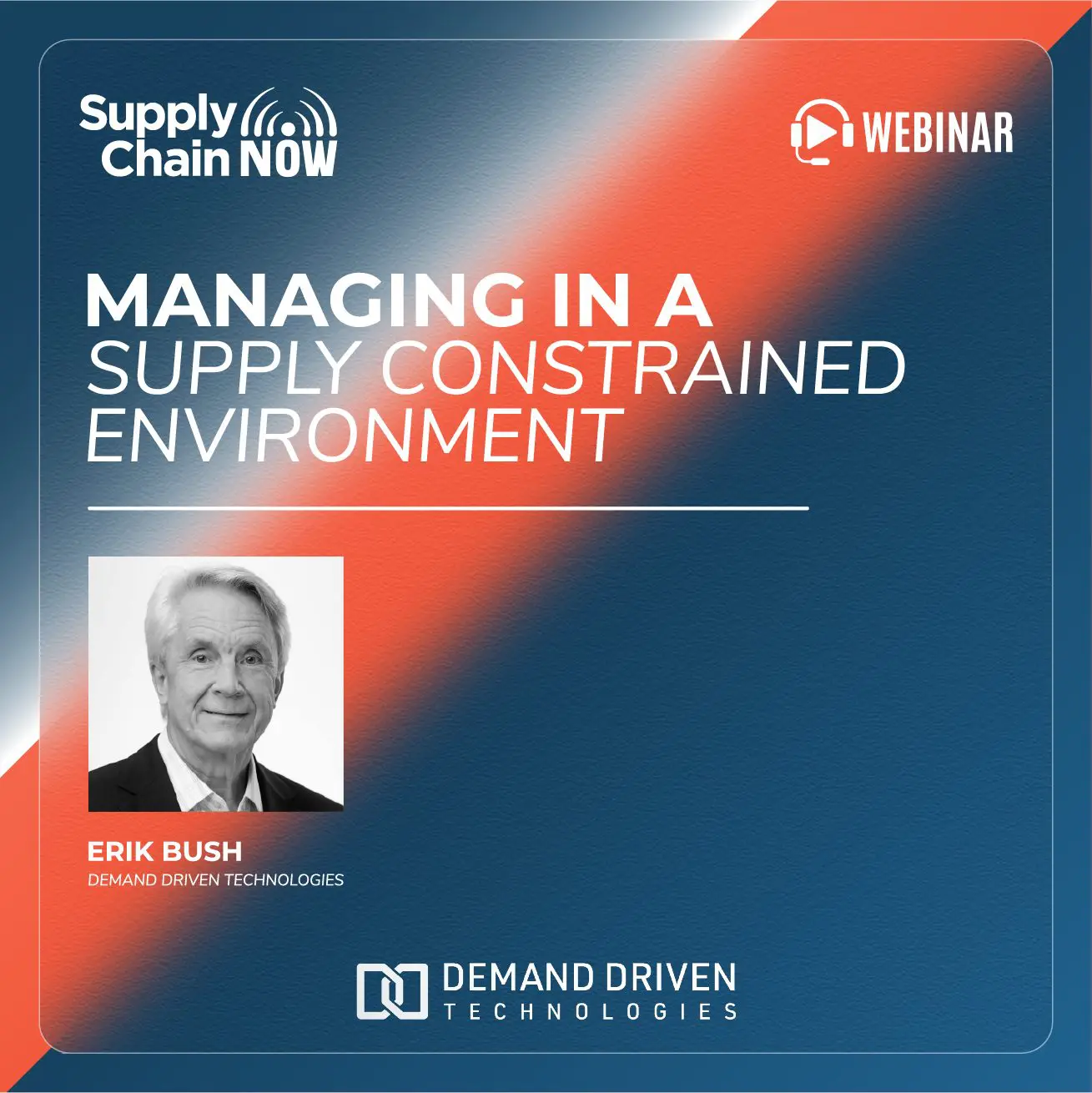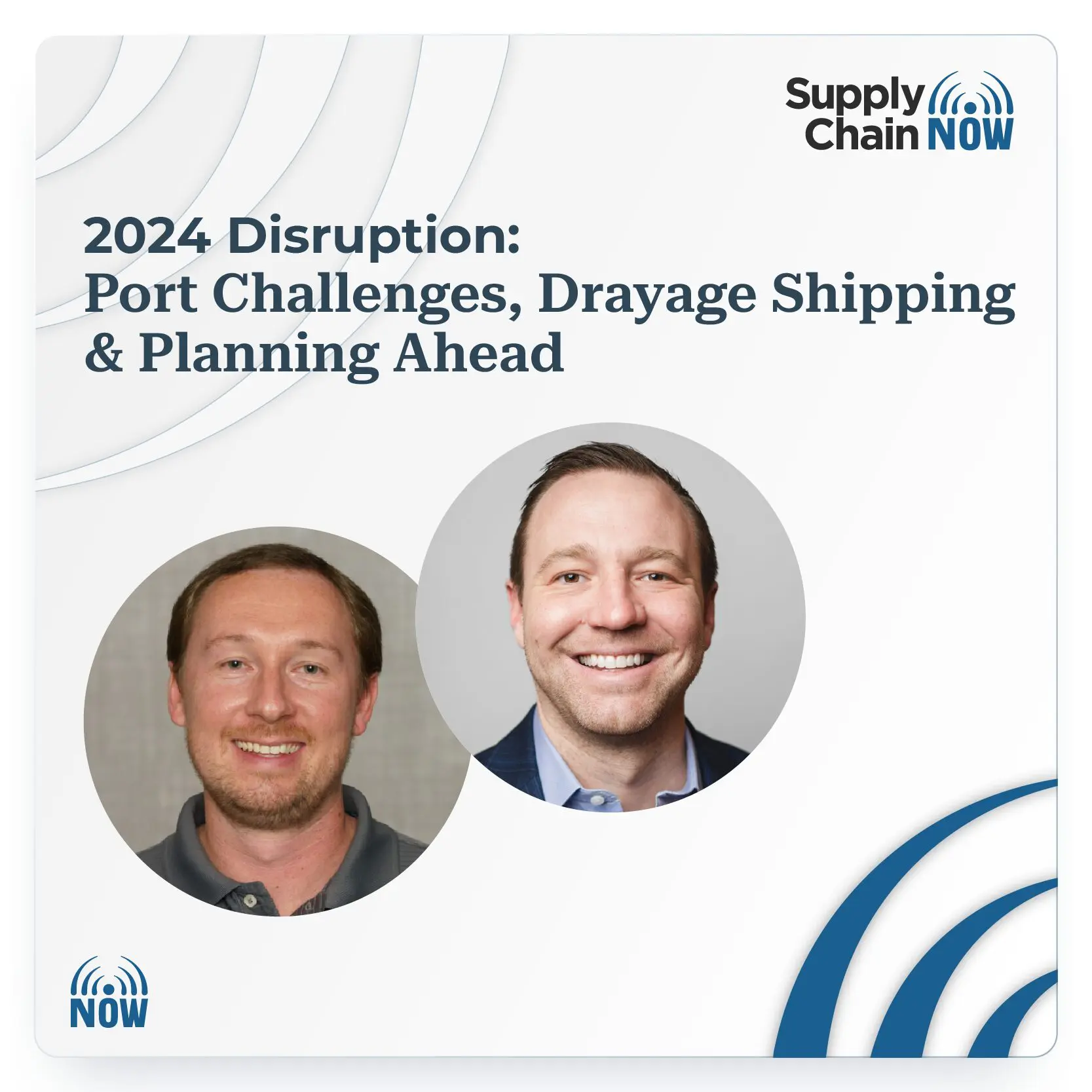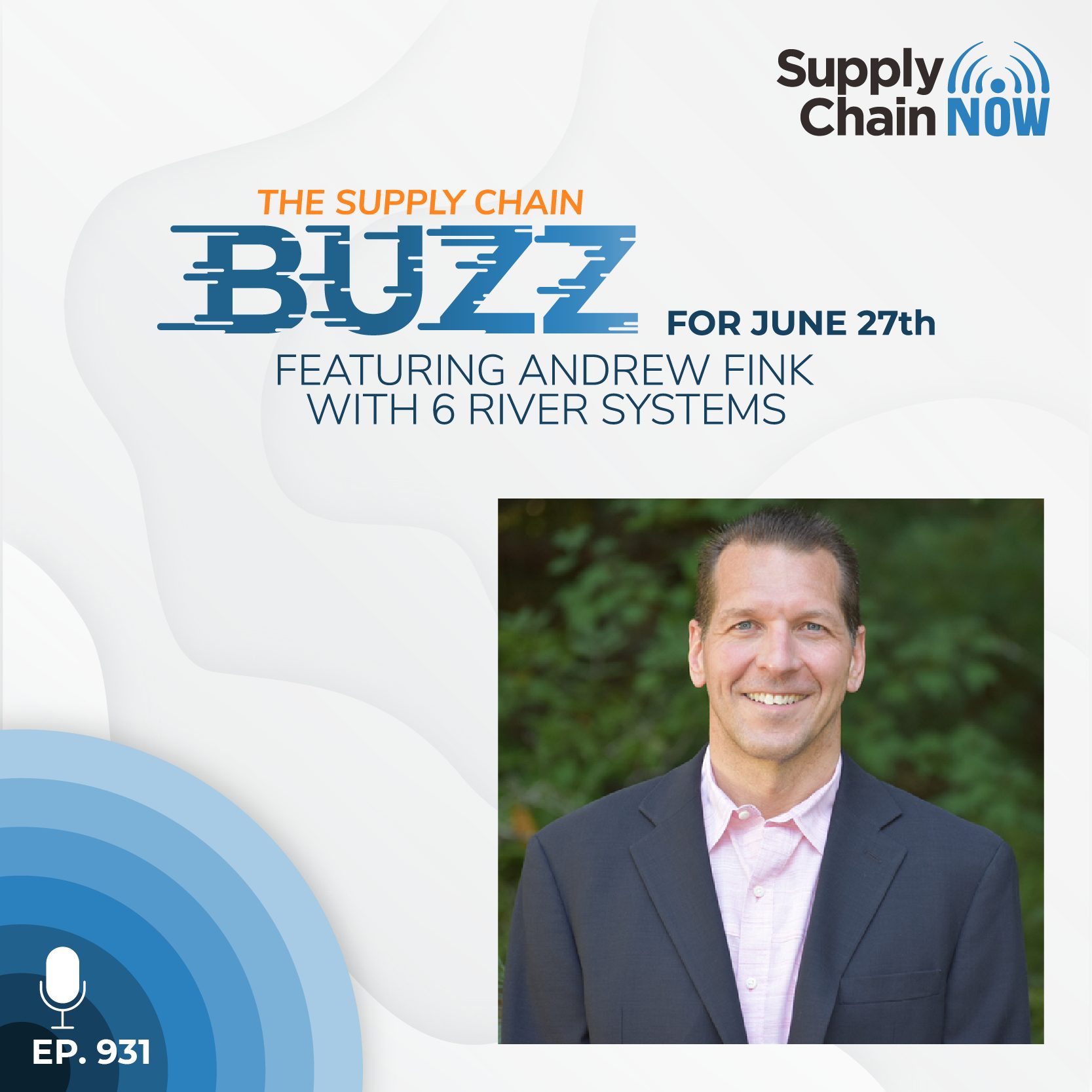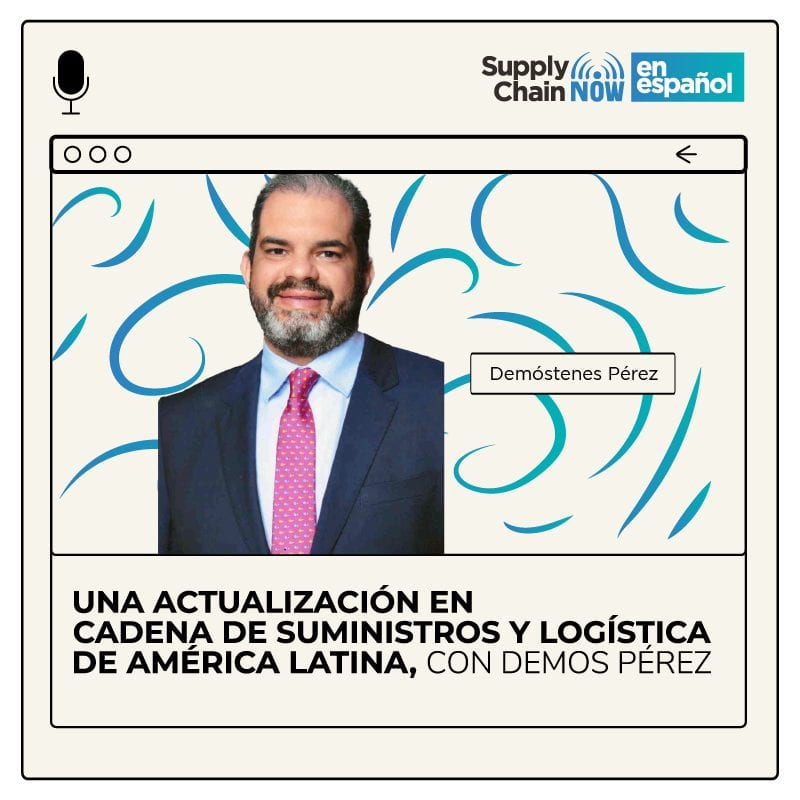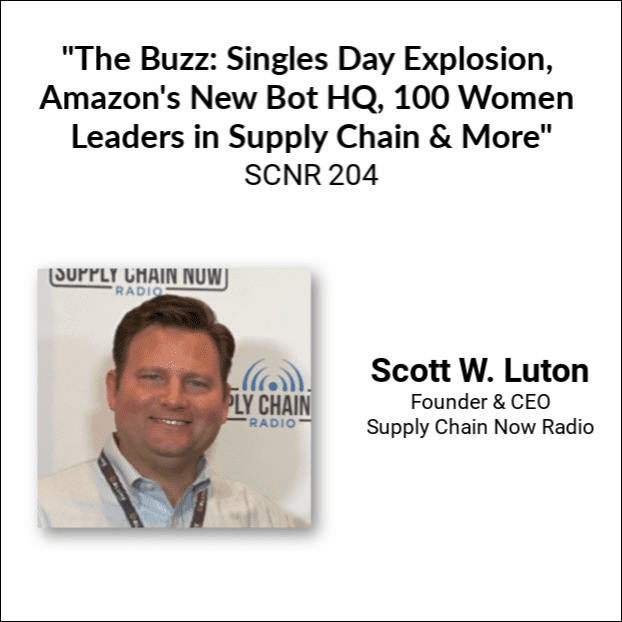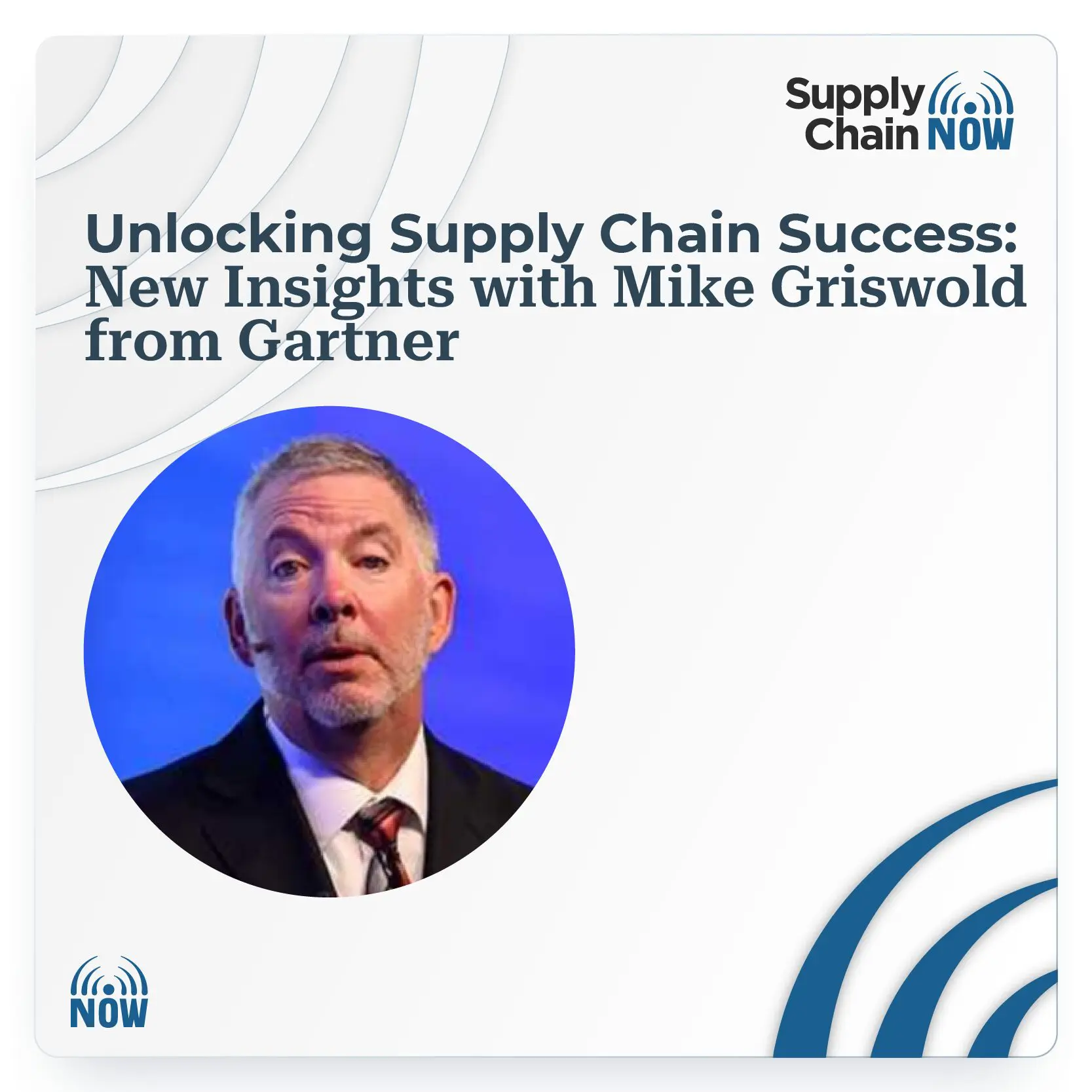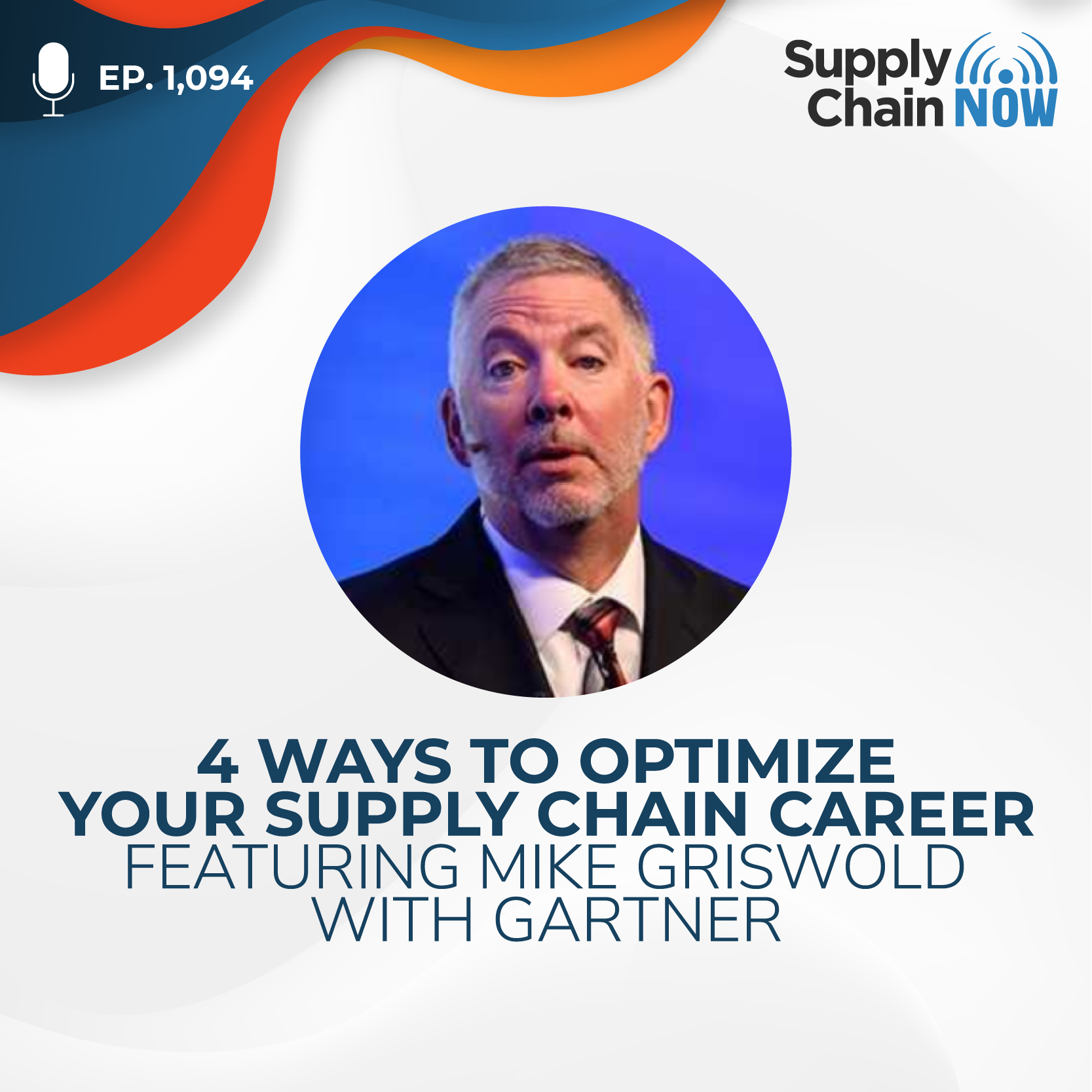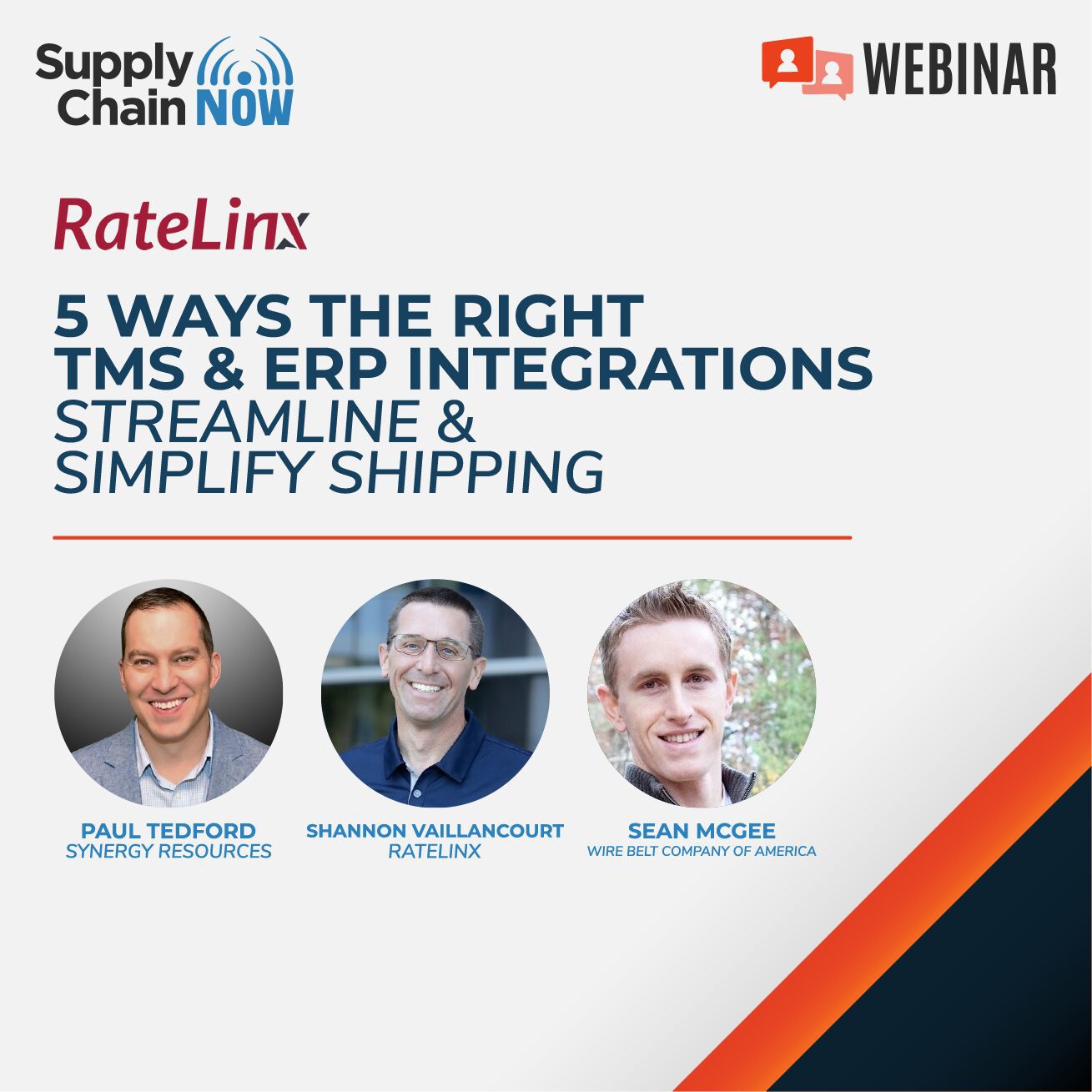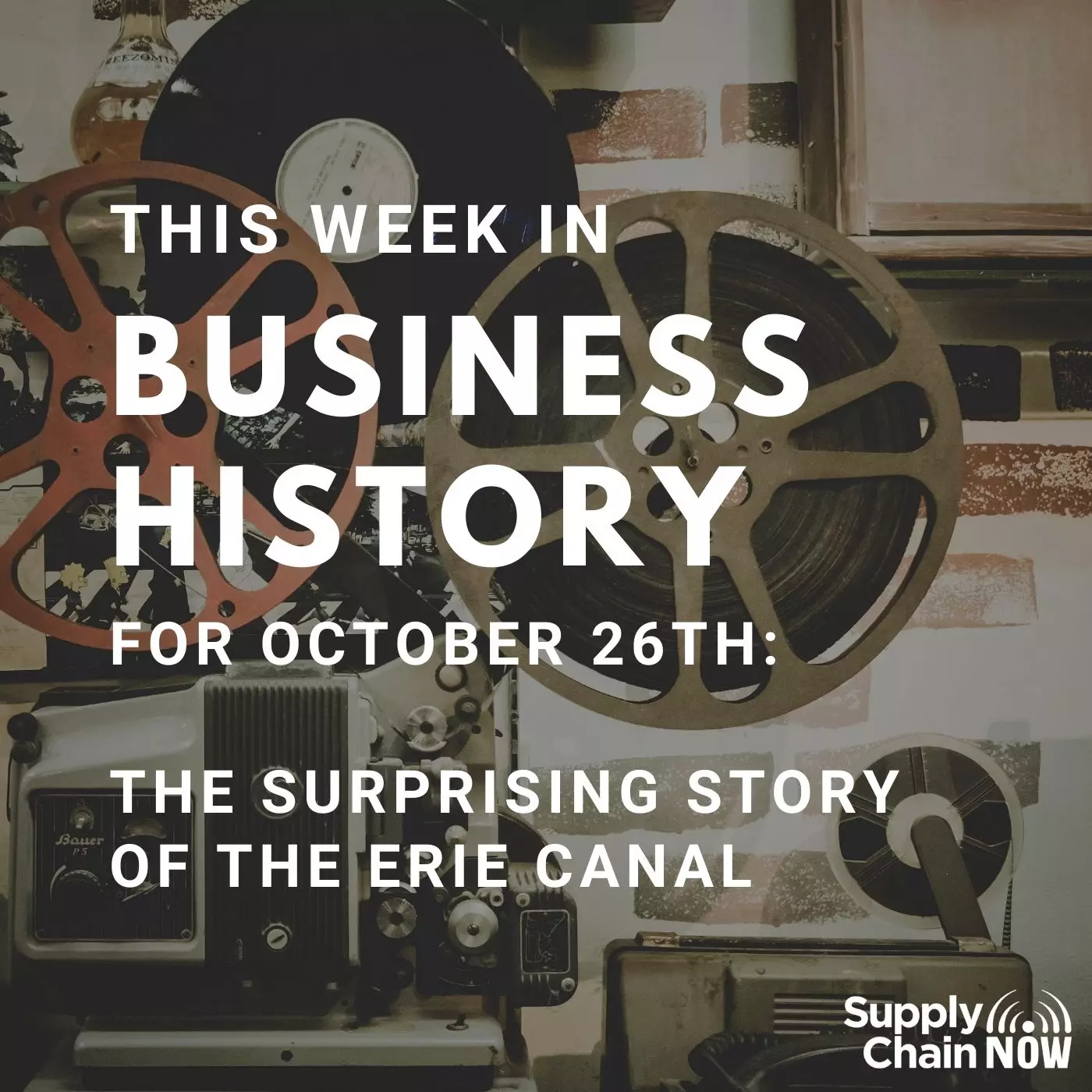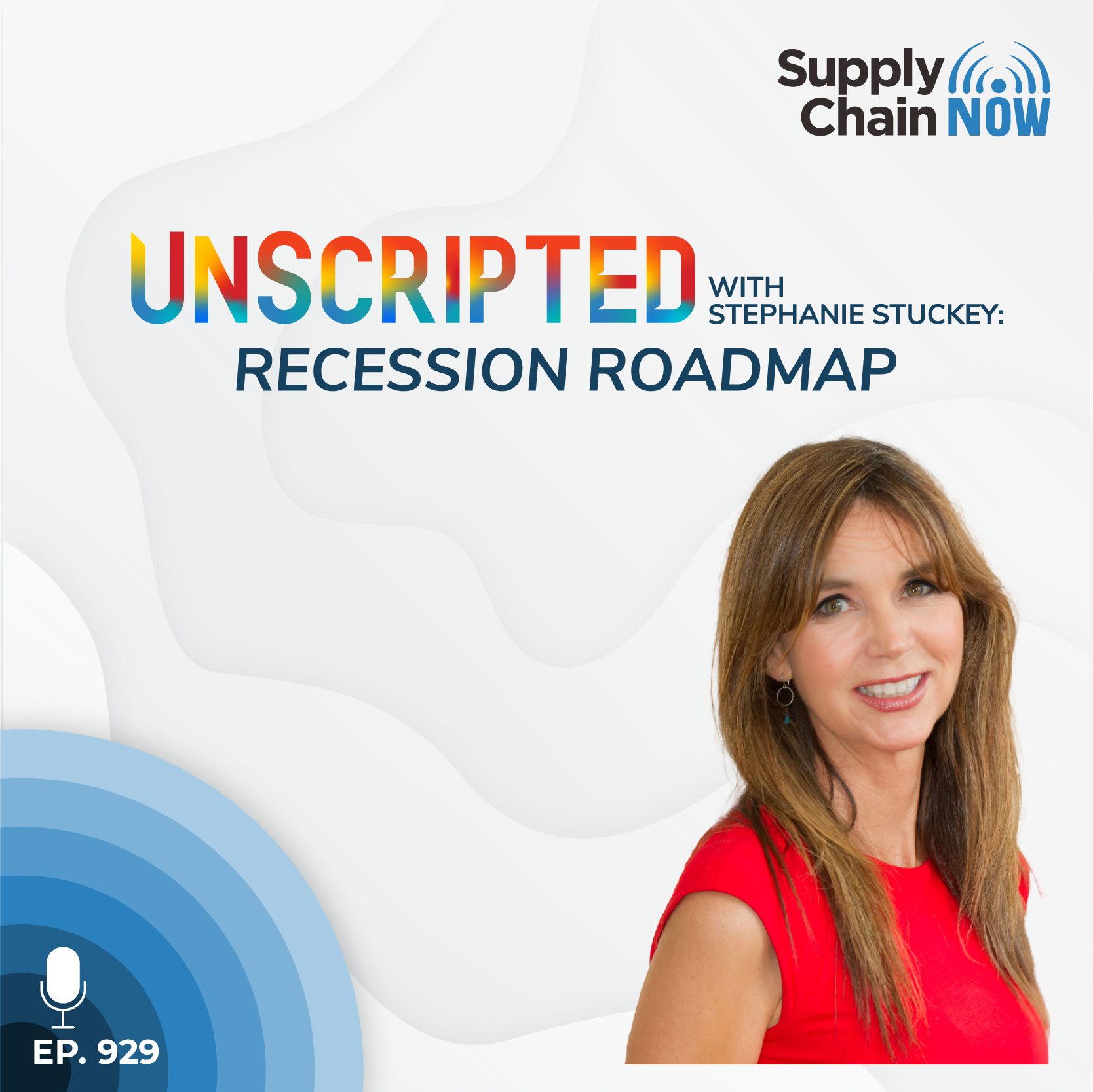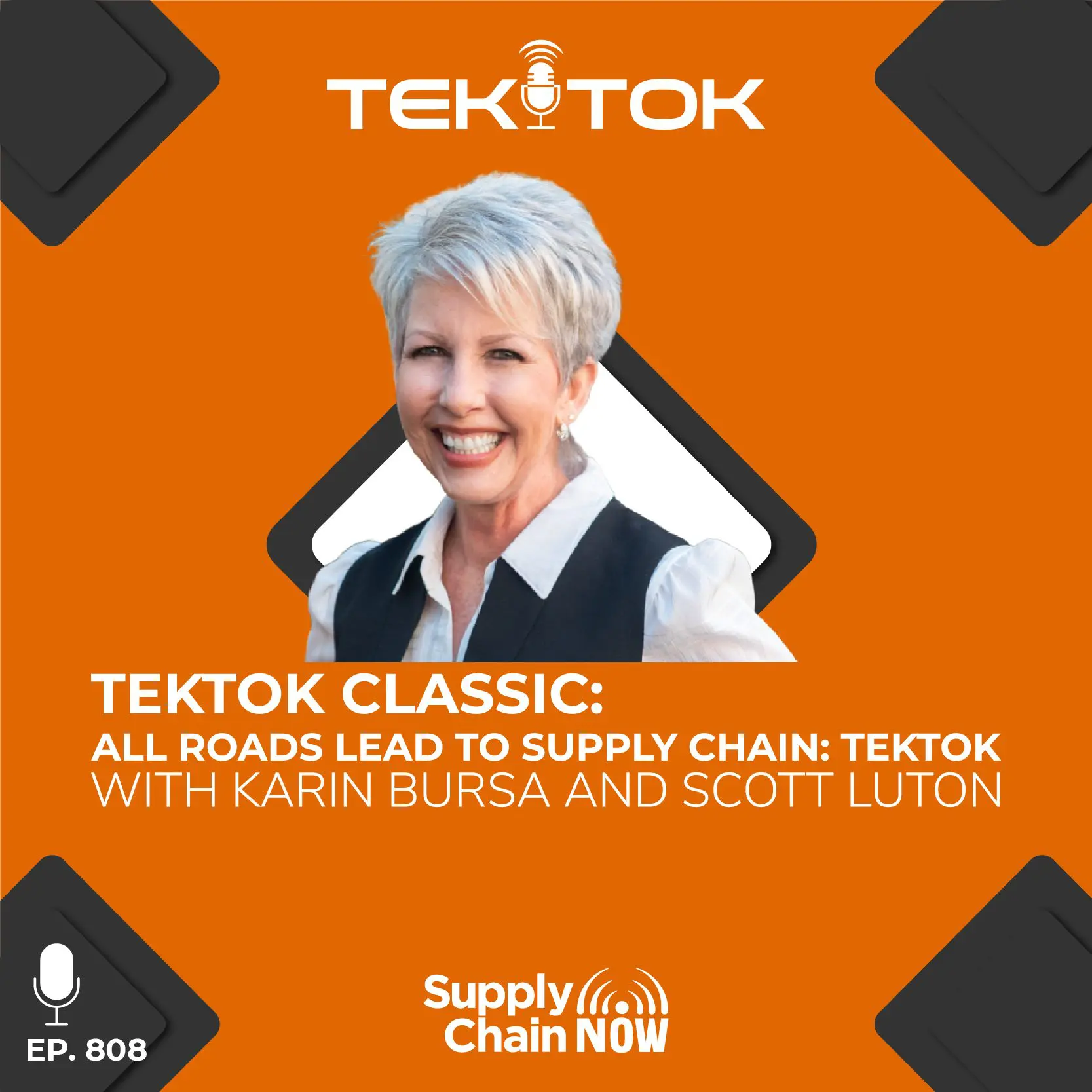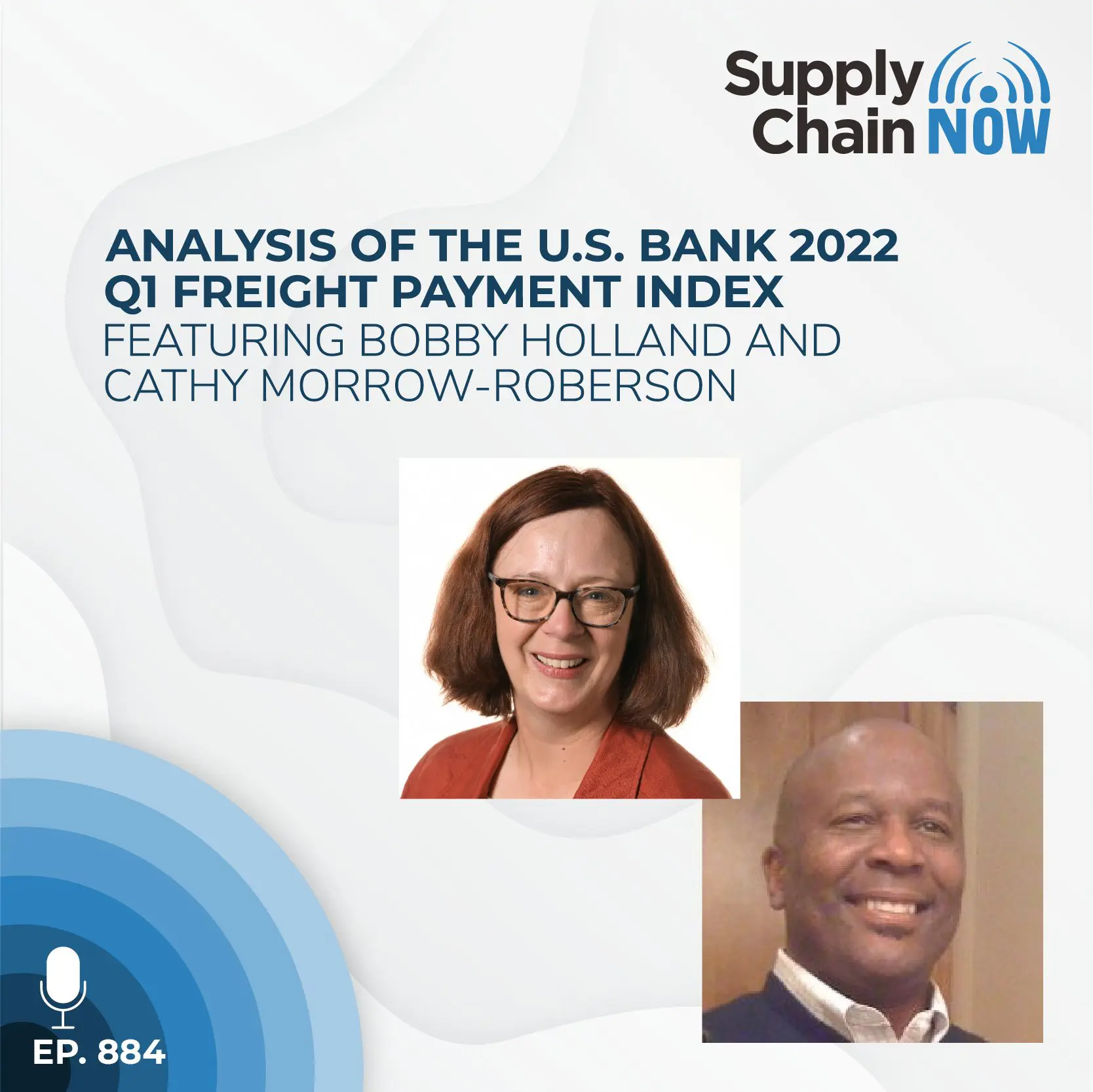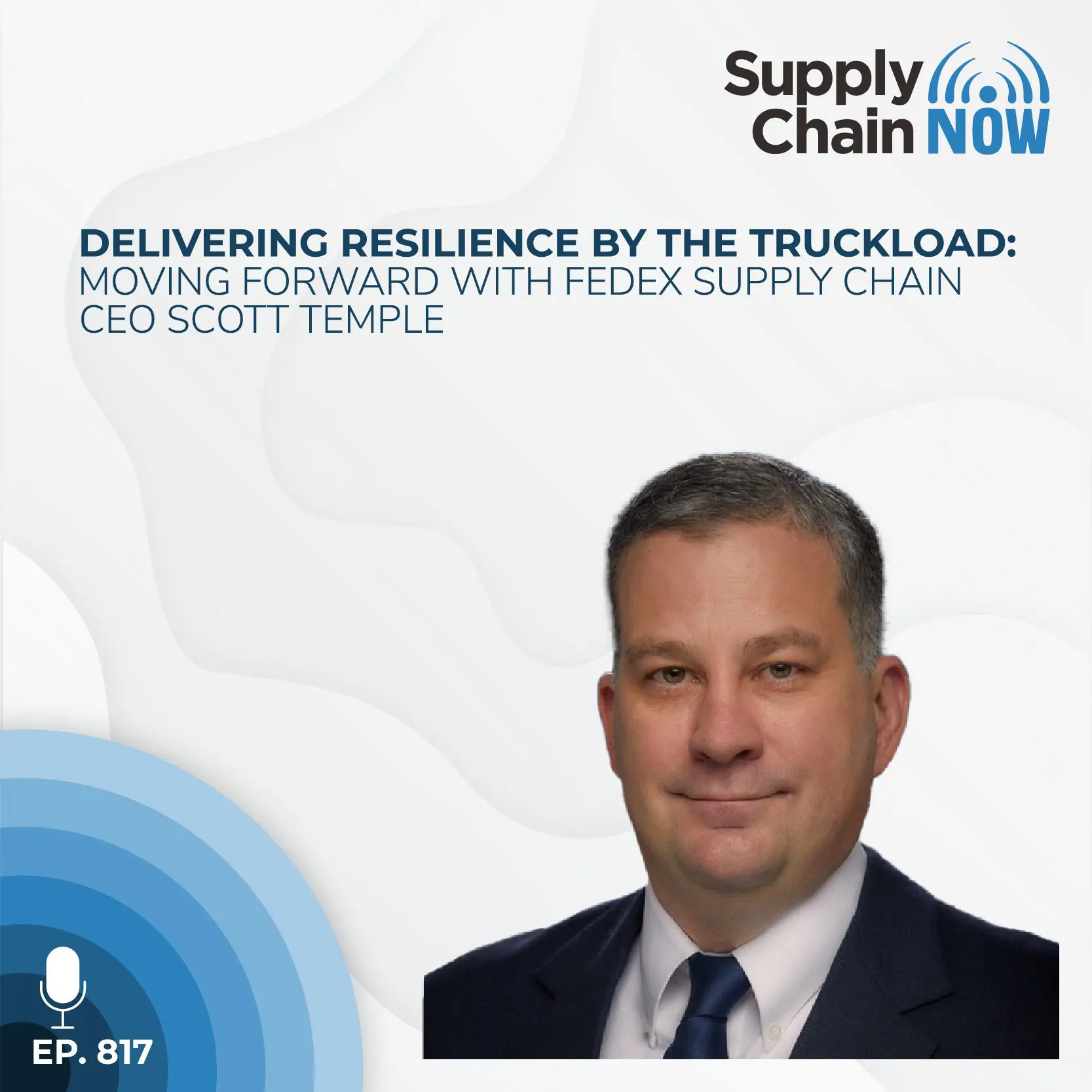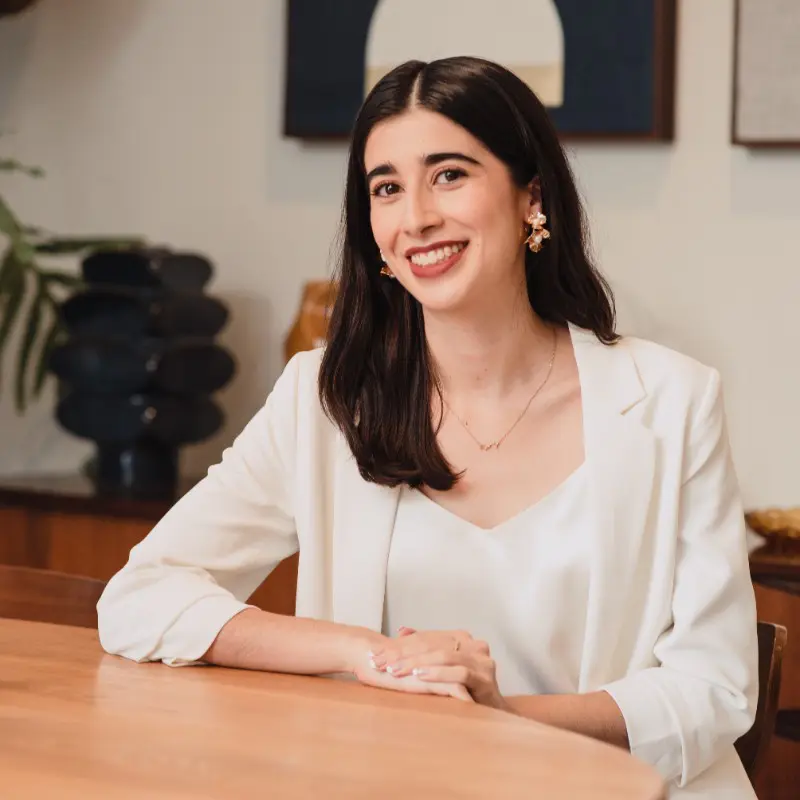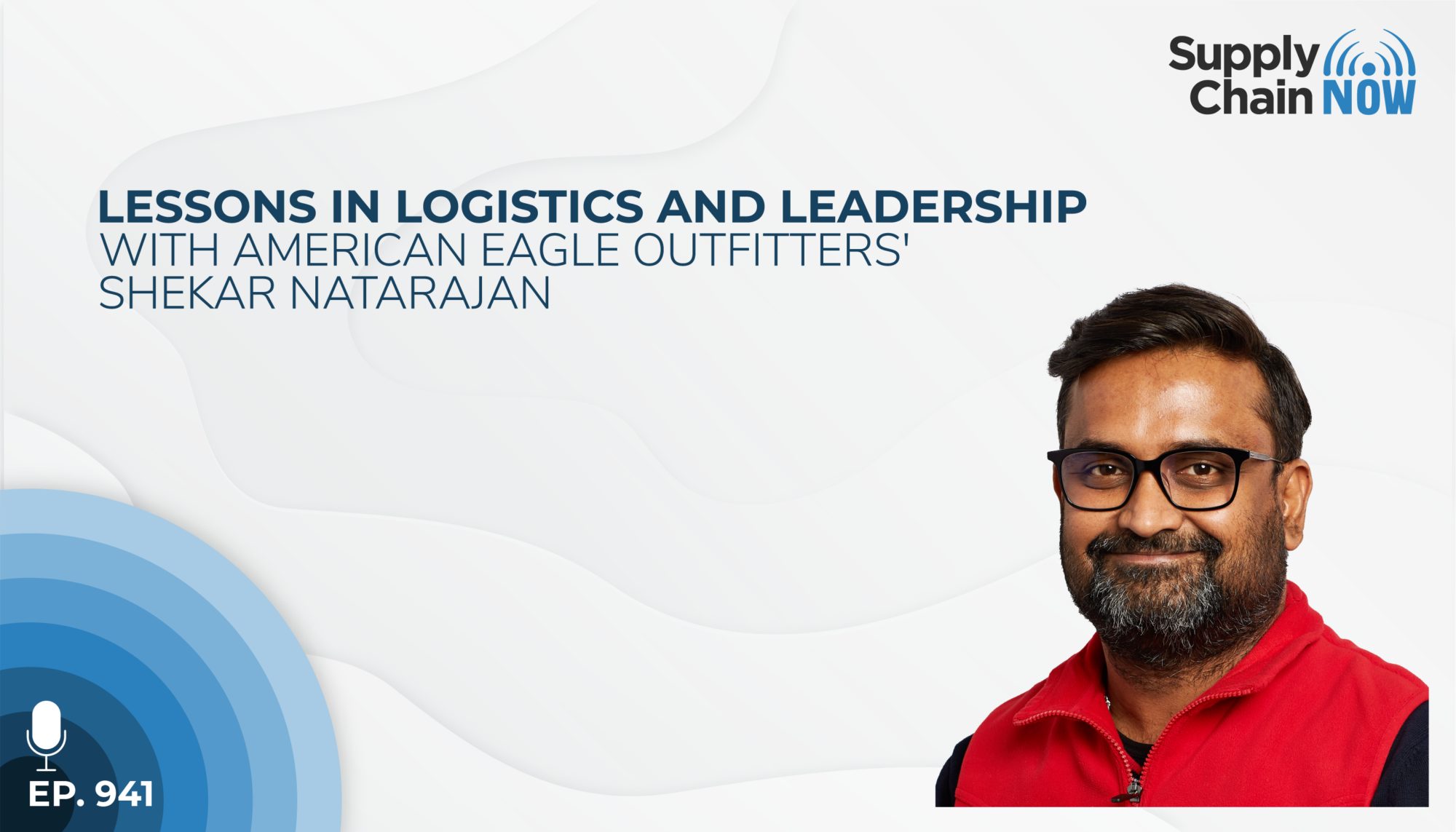
The customers pay you as a brand for the products you make and the experiences you provide, not for how big your supply chain is.
-Shekar Natarajan
Episode Summary
From a DVD resume to leading some of the world’s most complex supply chains, American Eagle Outfitters Executive Vice President Shekar Natarajan has seen and done it all. And now, he’s sharing his wisdom with Scott and Enrique (and you). Tune in to hear Shekar’s inspiring story, his thoughts on the importance of culture, competitive differentiation, what’s next for American Eagle Outfitters and more.
Episode Transcript
Intro/Outro (00:03):
Welcome to supply chain. Now the voice of global supply chain supply chain now focuses on the best in the business for our worldwide audience, the people, the technologies, the best practices, and today’s critical issues. The challenges and opportunities stay tuned to hear from those making global business happen right here on supply chain now.
Scott Luton (00:32):
Hey, good morning, everybody. Scott Luton and Enrique Alvarez with here on supply chain now welcome to today’s show Enrique, how you doing?
Enrique Alvarez (00:40):
I’m doing great. Thank you very much for having me, Scott. It’s always a pleasure, uh, to be here and we have an amazing guest today, so very
Scott Luton (00:46):
Excited. Amazing’s right. I tell you it’s been a long time coming. We’ve got a wonderful, uh, conversation teed up today. It’s we’re gonna be featuring a supply chain mover shaker, a supply chain leader, especially when it comes to the retail world. So with no further do wanna welcome in shaker, not a Raja executive vice president and chief supply chain officer with American Eagle Outfitters, uh, shaker, how you doing?
Shekar Natarajan (01:10):
I’m good. How are you doing Scott? Like, and, uh, nice to meet you Enrique.
Enrique Alvarez (01:13):
Very nice to see you shaker.
Scott Luton (01:15):
So good to have you here today. Uh, uh, we have been admirers of you and your organization love how you are challenging the status quo and, and from a variety of different perspectives. We’re gonna talk about some of that here today, but, uh, great. Appreciate you carving some time out with us here on supply chain now. So shaker, before we get into the heavy lifting, let’s get to know you a little better. Cause as we found out on the front end, you’re a big soccer fan, but before we talk even soccer, tell us where did you grow up and give us a few anecdotes from your upbringing?
Shekar Natarajan (01:44):
Sure, sure, sure. And like, no, it’s, uh, it’s an honor to be, uh, talking to you all. And um, um, I actually, uh, you know, come from India as a, probably a guest. Um, um, I’ve been in, um, actually like, you know, uh, my, we, we actually come from, uh, I come from slums in India, like, you know, they’re, uh, access to education, um, paying for funerals, uh, paying for marriages or like, you know, any function used to be like, um, you know, it was cul for us, including like, you know, paying for my grandmother’s, uh, cremation. Right. So, wow. Um, so, um, and, uh, family of eight, um, so, uh, we know it’s like three brothers and basically like my mom, dad, my mom’s, uh, cousins, like we all grew up together along with my grandmother. So all in like one room, like we, we actually shared one room and basically that was a kitchen that was also the bedroom.
Shekar Natarajan (02:44):
Um, and, uh, so fortunately like, you know, like my brother came and I, I followed him. Um, and, um, so he had some medical, uh, conditions. So I came here to United States about, uh, some 21 years ago. Um, and my choice of university, uh, was really to find a place which was closest to him that where I could hop into a Greyhound bus and go and visit him over the weekend. And that happened to be Georgia tech. And he happened to be, uh, at university of Alabama Tuscaloosa, uh, four hours away. And I came to United States, uh, with $34 in my pocket, you know? Wow. So like life has been amazing, you know, I cannot, uh, I can’t thong thank God enough in terms of, uh, the amazing blessings I’ve had and, um, and the friends that I’ve had like over the years, like you guys <laugh>, you know, it’s, uh, it’s amazing.
Scott Luton (03:38):
So shaker, I gotta follow up. Gosh, there’s so many questions I wanna pose, but for the sake of time, let’s, let’s stick with the, you know, your, to come AC to come here to the states with your brother. Yeah. With $34 in your pocket. I can’t imagine, you know, the, um, the, the anxiety and kind of what to expect and the unknown. How, how did you just confront that, put it in a headlock and, and just do it. How, how, how did you do that?
Shekar Natarajan (04:06):
Well, you know, uh, I guess like when you, when you grow up, like the way, like you grow up, like, you know, like, you know what we had to go through from a, a childhood perspective, uh, like most of my engineering, um, you know, is, was actually paid by friends and family. Uh, and like, you know, we are talking about like 5,000 rupees for engineering school for the entire year, which translates to about like $80. Right. And we, we couldn’t afford it basically like, you know, so we had a lot of family help and, uh, charitable organization, which actually donated for my education. And so when you, when you come, you know, when you grow up in the way that you grow up and, you know, family values become very important, like, you know, staying in one room, you know, sharing the, like, you know, in fact, like, you know, I, I used to wear all of the leftovers from my, from my brothers, you know, <laugh> generation pass
Scott Luton (04:56):
Down, you know? Right.
Shekar Natarajan (04:58):
So, uh, so I guess, um, you know, when you come from those kinds of situation, then everything, uh, is a plus, everything is a positive, you have nothing to lose in your life. Wow. At that point in time. So like that conviction and that persistent is, is what, like, you know, um, carried me along, like, you know, like, um, there have been ups and downs and, uh, there have been like some great moments in my life and some not so great moments. And basically like, you know, you just, you just roll with the, with the, uh, with the D and basically like, you know, you make the best you have.
Scott Luton (05:33):
Mm. All right. Uh, Enrique, before I, I ask, uh, Shera a follow up question or two, I know my hunches, this resonates with you. Well, uh, cause this is kind of how you’re geared, uh, in Enrique in many ways, your thoughts on, uh, Shaker’s journey here with his brother. Well,
Enrique Alvarez (05:49):
It really does. And I think that he’s being incredibly humble because this takes a lot of, uh, courage and, and, and a positive attitude to do what he, what he did. So, no, I’m, I’m inspired by your story and, and we’re just getting warmed up here with this conversation. So this is great. Thanks. Thanks for sharing.
Scott Luton (06:09):
So shake, let me ask you, so you, you sounds like you, uh, you went to school here at Georgia tech, which is, uh, based in Metro Atlanta, as most folks should know, uh, from a supply chain perspective, gardens ranked them once again, during a top 25 program, the one, the best, one of the, uh, they are the biggest industrial engineering program in the country. Mm-hmm <affirmative>, um, what’d you major in and, and, and what’d you love about the Atlanta area, uh, as you matriculated through mm-hmm
Shekar Natarajan (06:32):
<affirmative>, that’s, that’s interesting. So, yeah, like, so I went to industrial engineering program, uh, of all the things, um, and my, my back, my undergraduate was in mechatronics. Uh, so it was mechanical and robotics, and basically the closest, uh, was, uh, industrial engineering. At that time, it was kind of a quasi process, robotics and supply chain focus, logistics focus. So, um, and after you join, like, you know, you get to know like, uh, what a great school it is, you know, like you just admire it from outside, but when you get inside, like, you know, you just, you just love the school. Like it’s, it’s, it’s a, it’s, it’s one of the best, um, read rated best, but basically what makes it very unique is the professors, uh, the curriculum, uh, their focused on practicality versus really like theoretical, um, and, uh, the competitive nature of the students who actually get into the school that’s right.
Shekar Natarajan (07:26):
Actually that raises the bar for everyone around them. So, which is, which is truly amazing. Uh, and Atlanta is, is a beautiful city. Like, you know, it’s like closest to my heart. Um, you know, that, that’s where I, you know, spent my formative years in, in United States. Um, and, uh, what I love the most about Atlanta as a city is like, it has like, kind of the vibrancy of, uh, you know, what, you know, America is like, you know, you find, you find diversity, you find basically like diversity of choices in terms of like access to different kinds of culture people. Um, you know, it’s, it’s, it’s just a hob knob of things and that’s what America stands for. Mm. Uh, so you find, you find everything in, in, in Atlanta, what America stands for. Mm. Um, and, uh, you know, I, I, for the time I was actually going to the school, I never actually wandered anywhere beyond Midtown. And once I got my car, which was like three years later, <laugh> it was when I started driving around and kind of looking at the cities, but like my, mostly my travel laws, like on Greyhound to my brother. So whenever I had the opportunity to do so, so no it’s, um, and I have a lot of friends still, um, it’s, uh, it’s very close to my heart. And, uh, and, uh, you know, the land of Coca-Cola, you know, you can forget
Scott Luton (08:43):
That’s right. Land of Coca-Cola and peanuts and peaches. Yes. Uh, to share a few things,
Shekar Natarajan (08:50):
Every, everything in Atlanta starts with like a seed state, by the way,
Enrique Alvarez (08:52):
Everything’s peach three. Yep.
Scott Luton (08:55):
Well, so it sounds like clearly, uh, Atlanta and Georgia tech, uh, had a, a big impact on, on their early part of your journey. Of course, for my Georgia tech friends, I think a big, uh, mantra they’ve been embracing recent years is creating the next right. And then, and certainly they played a role in helping to shape the next, when it comes to supply chain. And we’re gonna touch on some of that here. Um, alright. So before I turn over to my dear friend Enrique, uh, let’s talk about, um, we’ve kind of covered your formative years. What brought you here a little bit of your journey, uh, as you, as you worked your way through, through school, um, here in the Atlanta area, but before you, what, you know, we’re gonna talk about what you’re doing now with American Eagle, but prior to your current role, what position or two really shaped your worldview shaker?
Shekar Natarajan (09:40):
Mm-hmm <affirmative>, you know, I I’m like Scott, like, you know, Scott and Enrique, like, you know, a lot of, a lot of things in my life are like purely miraculous coincidences, you know? Like, um, so you, you, you may be the best qualified candidate, but you don’t end up in the right role in the right company at the right time. Hmm. Right. Uh, it just, you know, you may, and those are all like coincidences that happen to me. Like, I, I work for Coke. I work for PepsiCo. I work for Wal Disney company, Walmart and target. And, uh, every one of those company, I would say shaped me in a different way. Um, Coke, as an example, in, uh, 2000 in early 2000 people were actually switching from beverages, like carbonated beverages to healthy choices and healthy choices created like a lot of skew complexity. Right. Right. And so these, like the, the Coke distribution system, the manufacturing were really like geared to produce like 5,000 products of different like sizes. And then very soon they were looking at like literally thousands of product and the combination of all of the different points of distribution. Plus basically the delivering to the stores. It’s just very complex. They PepsiCo and Coke make like a billion cans a day.
Scott Luton (11:09):
Right.
Shekar Natarajan (11:09):
Right. So, uh, so that, how do you take a complex supply chain, which was actually built for a different context business context, and then like evolve it to the new context of business where it is headed and simplify the operations. Right. That needed a lot of innovative thinking. And that’s why I say, like, I was very fortunate. Uh, and it’s a, it’s a long story. How I even got into Koch. I sent a movie resume, uh, to Ron Hammond.
Scott Luton (11:37):
Did you say a movie resume?
Shekar Natarajan (11:38):
I, I sent a movie resume, like, you know, I used to work for the multimedia lab, um, at, uh, Georgia tech, uh, teaching kids, like how to make like animations and movies and all that stuff. Um, you know, because when I graduated, I couldn’t find a job for seven months. I thought I was like a complete loser, by the way. <laugh> wow.
Scott Luton (11:57):
<laugh>
Shekar Natarajan (11:58):
Why wouldn’t be, why wouldn’t people hire me and like, you know, and like, so, um, but, uh, like, you know, you maximize whatever you have in front of you. And so, uh, so at that time I created a movie resume and it so happened that basically, because I worked for the library and the multimedia lab, I had access to Lexus nexus. Um, and I had, uh, basically searched for Coke, found the exec, found, ran Ron Hammond and, uh, created a, a small, um, uh, disc, uh, like, you know, it’s, it’s almost like, you know, the size of a, um, uh, you know, your, um,
Scott Luton (12:34):
Flash drive or something
Shekar Natarajan (12:35):
Flash drive, no, not flash drive, basically like your business card, it’s just as, as big a business. Yeah. And so it, so it’s literally fits in your pocket, uh, burn those, send them out, uh, to people, uh, that I was know, trying to actually get recruited into, uh, apparently the day, um, Ron got it. His admin was out, so usually she’s the gatekeeper. So it sneaked into Ron’s office. Ron looked at it and then he said, Hey, I gotta hire this kid. You know, <laugh>
Scott Luton (13:03):
Very creative introduction, for sure.
Shekar Natarajan (13:05):
So, so like, how do you explain that? You know, it’s like really like, God’s grace, you know, and miracle like, you know, which it’s distant to happen. And so, um, so my journey from Coke to PepsiCo, um, and the beverage portfolio kind of rethinking and distribution, uh, really shaped my formative years from a leadership perspective. How do you think about innovation? How do you think about the intersection of operations technology and optimization all at the same time and, uh, you know, kind of construct that to the, the benefit of a large corporation. Um, and so, so that was, that was, uh, and, you know, when you’re, when you’re in that kind of a world, your, your, your strengths get amplified and my strength is never to give up. Mm. And never take no for an answer. Mm. Right. Because like, they’re gonna be like a thousand reasons why people are gonna say no to anything that they were doing, and they gotta do differently, including like myself, like, you know, I don’t change my breakfast in the morning and why do I expect people to change, like the ways of working. Right. Mm. So it’s very difficult on a lot of people. So like, but you, you just like learn that muscle of kind of like finding a way
Scott Luton (14:20):
To learn that muscle and then, and then exercise that muscle. Right. All the time, really quick, uh, in Mary Kay, first off to any of our, any of our listeners that may be in that position where they’re looking for their first job or their next job, or they’re in that transition, Hey, take heart with what shaker shared, find a creative way of reaching and really creating your own. Look, in this case, you’re creating a, a video resume, uh, and, and, and at least giving a chance of getting pass a gatekeeper. Right. Rather, rather than saying, oh, they’ll never look at it. And then closing that door on your, on your own end on, on your end. You know, don’t, don’t give into that, but Enrique, before I got one more quick follow up question to shaker, before I turn over and start talking American Eagle, based on some of the companies, he mentioned your thoughts on never give up, never gonna give in your thoughts on what shaker shared thus far in reque.
Enrique Alvarez (15:14):
Well, I think, uh, and I’ve been making a lot of notes as I usually do, but cuz this is very good advice for not only supply chain professionals, but just for people around, uh, any type of industry. And I think just never give up is, uh, is usually, uh, a very, very good advice to anyone cuz that’s why I believe, uh, people do things right. It’s not necessarily always the brightest or smartest or hard or not even, it’s always the hardest working committed stubborn guys that make it to the end. And so I, I appreciate that, uh, tenacity and, and of course not taking no for an answer that that would, that’s pretty good.
Scott Luton (15:54):
I do too. Uh, I do too. All right. One final question. And, and Enrique’s gonna take it from here. Uh, sheer, you mentioned Walmart and Wal Disney and Pepsi co and, and Coca-Cola amongst others, all of those iconic and powerful cultures, right? Different points in history and whatnot. What’s um, when, when you think of culture and, and those environments you worked in had the good fortune of, of having experience in what’s one thing that really, uh, that really sticks out to this day that really shapes maybe how you lead culture with where you are now.
Shekar Natarajan (16:26):
Well, in like all of these companies, um, in all of these companies, there was one common theme, right? They’re all strong cultures centered around people and their values. Like, so basically every company has its own set of value system. What makes it unique and how they approach problems and how they think about like businesses in general, their impact to society. And, uh, so, uh, every, every company is a tribe in itself, right? And that tribe is actually formed by the norms and the values that company ascribes to, and they all center around people. How do you basically organize your thinking around people? Right. Unleashing the power of people unleashing the true talent, like giving them an opportunity to kind of grow and succeed. And if you look at like the companies that I am talking about, right. Like, you know, just take Walmart as an example, when you see, uh, Doug McMillan, who’s the CEO of the company, which is like the largest that we know Walmart, he walks around with a tag on his like, uh, collar. And if you didn’t know, it was Doug McMillan, you would never know that he was Doug McMillan by the way.
Scott Luton (17:40):
Right.
Shekar Natarajan (17:41):
CEO of Walmart. And, and so, so like, so all like, you know, every company had its own ethos, you know, uh, uh, it was the servant leadership model. Like, you know, when it comes to Walmart. Mm. Uh, they empower people basically like, you know, everyone is the same. Everyone wears the bass the same, whether you’re the CEO of the company, whether you’re basically like, you know, doing an analyst work. Right. Um, and everyone wears it on the collar. They don’t wear it like in the pan. Right. Right. Um, so, um, you know, so you know, you, if you, if you look at like all, what makes these companies unique? Uh it’s it’s really like how they kind of like bring that culture to life. And for me, like a lot of people think that culture is something which is there to stay. I disagree with that culture is one thing which always evolves. That’s why you bring in new people. That’s why you bring in new experiences. Yep. Values, values are the ones which actually always stays the same.
Scott Luton (18:40):
Yep. Right. Well said. So living and breathing organism, it really is. Um, uh, alright. One last comment. So coach John wooden, I shared this on social. I loved one of his, uh Woodenisms you know, he won 10 national championships UCLA. And one thing that his coaches and his staffs and his players knew is what he’d call his version of NBA. And that was the mop bucket attitude. No task was beneath any coach, any player, whatever it took for the team to win as a whole. And that is such a, kind of goes along the lines of what you’re speaking to. And, uh, I’ve been using the heck out of that NBA by John wooden here lately. Um, alright. So Enrique, where are we going now with shaker here?
Enrique Alvarez (19:21):
Well, we would like to talk a little more about your current role and of course, about American Eagle, an amazing company. And also, um, first and foremost, uh, tell us a little bit more about the general supply chain organization at American Eagle, so that people that are listening to us can better understand the complexity of this amazing company too. Mm
Shekar Natarajan (19:40):
Yeah. Yeah, no, that’s a great question. So, and, uh, my American Eagle, uh, responsibility kind of B for kids between, uh, the two worlds that I live in, um, and both of them are pretty exciting by the way. Um, uh, the first side of the role is basically the American Eagle, the brand itself, and the supply chain that I support. So my responsibility sta starts from the time the product gets handed over. Uh, so it’s made in the factories and gets handed over and, uh, all the way to the doorstep and the doorstep includes the doorstep of the store or the doorstep of the end consumer. So everything from inbounding, the freight, the, the trade management, uh, transload operations, bringing them into the DC, distributing it out to the edge facilities and then basically fulfilling the stores and the e-commerce orders, including customer promise and inventory allocation.
Shekar Natarajan (20:38):
So my team actually manages once, like the merchants decide like how much to buy and what to buy. We then actually take the custody of the inventory and say how to place the inventory across all of the different locations, that way we could maximize what was bought. Right. So that’s essentially like, uh, the role that we played. So that’s, that’s the American ego side of the, um, uh, the, the responsibility. And so to, to give you context, American Eagle moves 225 million units. Um, you know, basically like, you know, we, we are in 28 countries, um, we’ve sourced product all over the world. Uh, so we bring it into the, we bring basically all of the product into east and west coast, uh, into five different ports of entry. Uh, we have two distribution centers, uh, large distribution, national distribution centers, one in Kansas, one in Hazleton.
Shekar Natarajan (21:32):
And then we have, uh, a newly purchased business, which is quite logistics and they are in like 10 different markets, uh, eight different markets, 10 different locations, uh, expanding into 20 markets next year. Right. So, um, so that’s essentially the, the footprint of the distribution. So we then figure out out how to kind of move all of the goods across all of these things. Plus all the stores that we have about like a thousand stores, both area and AE combined, or 1200 of them that we kind of get the product into. So, um, so it’s a, it’s a, it’s, it’s fun. It’s, it’s a fun role. Uh, supply chains have gotten even more sexier these days.
Enrique Alvarez (22:12):
<laugh> right, right.
Shekar Natarajan (22:13):
<laugh>, you know, like, you know, you say supply chain and like people like, whoa, what are you doing in? And now like knows what the supply chain is. Um, so it’s, it’s fun to be in that, uh, position. Um, and my second part of the role, um, is, uh, is basically this business that we, these two businesses that we purchased. Um, and, uh, and we can get into the context of why and other things, but it’s quiet logistics, primarily quiet is, uh, you know, it’s the edge fulfillment consolidation, um, kind of a network. So primarily before, like, you know, the product gets to your doorstep, how do I provide value added services at the edge of the network? So these are like localized fulfillment centers, closer to big metropolis so that we could access the customer same day next day from each of these sites, uh, <inaudible> is the smart freight company. So we, we are not like, we are not, we are not carriers. We essentially like aggregate the carriers, uh, both national, regional, and local, all of them together, like stitch them into our national hole. And basically we, we then move the freight across using that system of carriers in intelligent.
Enrique Alvarez (23:26):
Are these two acquisitions more in line with the eCommerce side of the business? Or is there also used for every part of the, the business, including the DCS that you mentioned and all the Towson stores and all that?
Shekar Natarajan (23:37):
Yeah. So basically like, you know, this, these are Omni compliant. In fact, like <inaudible> pools orders across multiple brands and across multiple forms of inventory. Right? So basically it moves packages, it moves raw inventory, it moves retail and transfer units, all of them together in one truck, because all of them are heading, heading in this the same direction. You might as well pull them together. Right. Whether it’s your brand or multiple brands together. Right. So, and, uh, quiet also is multi-tenancy. So we have like, you know, about, uh, 50 brands that quiet actually services today. Um, so basically we are all at the edge of the network. So like we have a facility in Dallas, Boston St. Louis LA, Jacksonville, um, and, uh, Chicago. Yep. Uh, and we would just open the Atlanta facility. So like, you know, so we are in eight markets, 10 locations, uh, and primarily like, you know, we have all brands from PON, fanatics, uh, S Steve Adams and others, which we service from these locations. So we have about 50 brands. Wow.
Scott Luton (24:47):
When you getting sleep between American logistics and air terror, goodness gracious. Shaker.
Shekar Natarajan (24:52):
Yeah. My job is 24 7, but it’s, it’s fun and exciting because you get to like, you know, uh, and going back to the question of like, what, what formed my thinking, right. Like, you know, um, is I had this, I had this, uh, moment of solitude, I guess. Right. Like, so my mom was not, well, I had to go back to India in 2018 and like, she was hospitalized. I didn’t have, um, much to do, except like, you know, just kind of take care of her and kind of like, you know, like stay in the hospital and other things. And during that time, um, I was reflecting on a lot of things about like my purpose in my life and what I need to do and other things, and it became pretty apparent having played the role that I played in all the big companies that a midsize retailer can never compete on their supply chain trends.
Shekar Natarajan (25:50):
Hmm. With a big player. So, and let me, let me give you like, like an example to drive that, right? Yeah. So Walmart moves 50 billion units a year. American Eagle moves 225 million units a year. Mm. So what Walmart does in a day and a half American Eagle does in a year. Right. So it’s, it’s like 250 American Eagles make up a Walmart. Right. Volume. Right. Right. So, so like, so if you’re thinking that, you know what, you’re gonna somehow mimic the scale of the Walmart or an Amazon, uh, then, you know, I don’t think you’re realistic. Like it’s not even like, it’s not even, it’s, you know, there’s something called utopia. This is like dystopia thinking. Right. Like, you know, <laugh>
Enrique Alvarez (26:45):
Yeah. You
Shekar Natarajan (26:46):
Know, so, um, so I, I don’t think you can never get, you can never get there because you need like that kind of scale to like, to privatize your network. And so if the world is actually, if the Amazons of the world and the Walmarts are wor of the world are creating private networks, right. There was never an analog of a open and a public network. Like, you know, just like you have apple, which is a close loop system, right. There was never an Android that was like, that’s exist in the supply chain world. And so that was a Ker of thought that I had. And it goes back to like the story that I was relating to you having come to United States, Scott and Enrique, it didn’t matter who I was. Right. How I looked the way I was carrying myself. I don’t even have an accent by the way, for having lived here for 21 years. And, and people have accepted me, they’ve given me an opportunity, many times, many opportunities, right. And for businesses, it’s not a level playing field. So what America did to me to create a level playing field is what I wanted to create for businesses.
Scott Luton (28:02):
Uh, alright. So I love this shaker. I love this so much. So, uh, you know, American Eagle, wasn’t gonna be the size of Walmart overnight, or maybe even over month, or maybe even over the years, but what you’ve done with this acquisition of quiet logistics near terror is not only allow the supply chain organization, uh, and, and the extended organization to be a better competitive advantage for American Eagle, but you’re also opening up the doors for other folks, um, for, for other customers to take advantage of the same opportunity, right?
Shekar Natarajan (28:35):
Yeah,
Scott Luton (28:36):
Man, a shining beacon of democratization in industry Enrique. I love it.
Enrique Alvarez (28:41):
Absolutely. And I think it’s just the, from a strategic standpoint, it’s probably the only way that you can successfully compete against is giants. Cause checker was saying they’re just so ahead of everyone else that there’s just, you just have to do things like this, right. More creatively, more innovatively and bring together
Scott Luton (28:59):
People boldly,
Enrique Alvarez (29:01):
Boldly. Yeah.
Shekar Natarajan (29:02):
Well, I, I, I, I think like, you know, I, I, I pondered, like, that’s why I said like, you know, I had this moment of solitude and, you know, when you, when you reflect on all things, uh, that, uh, you know, that you have done in your life, and basically you think about like, what are all the different alternatives you could conjure up to actually like, you know, bring like a mid retailer or like a small retailer, like up to the level and standard and quality of service, uh, and the cost advantage that big players have. Um, I couldn’t come up with one, right. I couldn’t come up with one. Um, and so that led me down this path of open and sharing networks. And, uh, so I also believe that the customers pay you as a brand for the products you make and the experiences you provide, not for how big your supply chain is. And let me give you an example, Coke, guess what is in Coke? 99% is water, right.
Scott Luton (30:08):
<laugh>
Shekar Natarajan (30:09):
Right. And like this formula and like, you know, and, uh, I don’t wanna, like, you know, and it’s unique by the way, it’s new, it’s unique, you know, people like, you know, pledges that it’s, the formula is unique, right? It is it actually, by the way. Um, and, uh, but Coke never decided to build a reservoir. It draws water. Right,
Scott Luton (30:30):
Right,
Shekar Natarajan (30:31):
Right. So, so I, I think like, you know, so there are a few things that kind of form your core competency. It’s the formula, it’s how you present the product. Right. It’s how basically people like, you know, uh, consume it. Right. And what are they willing to pay for it? It’s not necessarily like how many distribution centers you have, how many trucks you put on the ground, how many people that you have in the DC
Scott Luton (30:54):
Consumers don’t care about that at the end of the day.
Shekar Natarajan (30:56):
Right. Absolutely.
Scott Luton (30:57):
Um, alright, one question and, and Reka, we can take a pick back up on his favorite aspect of his role, but really quick, as you’re talking, whatever you can share shaker, as you’re talking to the leadership, the rest of the executive leadership at American Eagle, and coming up with this idea of acquiring these companies to change, really change the game for American Eagle, how difficult, and going back to your earliest advice, never giving in how, how, how uphill of a conversation and discussion was that for you to get everyone to sign off and say, let’s do it
Shekar Natarajan (31:34):
Well, um, like, as I said, my life is not only, uh, a lot of, uh, accidental, like, you know, Miras, I would say, but also like too many good people, um, that have come in my life. And like the, uh, the, the two that are my absolute favorite, uh, is basically Michael repel. Uh, who’s the chief operating officer of American Eagle and my boss, and then also Jay short Stein and Jay actually treats me like a son and he’s a CEO. Right. And so we share like amazing relationship. And, um, and so when I pitched this idea, uh, in 2018, um, both Michael and Jay saw this as an opportunity, uh, to create a business around it. Right. Um, but we, we didn’t rush to kind of like, you know, secure the future. Right. We said like, you know, basically let’s prove to ourselves. And once you prove this to ourselves, then we could basically, uh, turn around and say, Hey, listen, like, this is where the world needs to go.
Shekar Natarajan (32:43):
Um, and you know, we create a business opportunity out of the positive results that we have created for ourselves. So it was converting the cost center into a profit center, showing that the profit center can now be like, you know, everyone’s profit pool, right. Like, how do we kind of like do that? So we took a very methodical approach in terms of how we wanna approach this problem. And, um, COVID actually accelerated this. This was a strategy that we had, like, we thought, like, you know, we were gonna unveil over like two, three years. Um, and, uh, COVID actually created the need for us to create distribution capacity, transportation capacity. And we said like, you know, there are two ways of going about it. Like when we can hunker down and say, uh, let’s wait for the perfect moment to happen, or let’s take the bull by the Hans figure out how to actually focus on this, make it happen.
Shekar Natarajan (33:31):
And so there were many highs and lows in, in this journey too. Right. Right. There were a lot of, there were a lot of like non-believers, uh, and there were some, you know, there were people who were kind of like trying to figure out like how this is all going with. And sometimes if you are, if, if you are, you know, a couple of steps ahead of others, people are trying to see like, you know, like, are you gonna be walking straight or taking a left or right. Like, so like, you know, there’s always like, you know, even in, even for the two steps you’re taking ahead of others, right. So now if you are like a few miles ahead of others, then like, you know, you have a real problem. Like people are trying to anticipate where you, where this is headed. So a lot of this also came down to communication, clarity of thought and what we are trying to do.
Shekar Natarajan (34:13):
And, um, you know, whenever we got to that point of clarity of thought and what we’re trying to do, uh, people were energized till then it was like a lot of persistence. Like how do you kind of like, keep telling the same thing 50 times? And like, you know, then it like eventually, like, you know, people get it and, uh, you’re able to make progress. So there was a lot of that that we had to do. And the last 20 years of change management, I guess, and last 20 years of all failures, <laugh> made me realize, um, the importance of, uh, coming up with a very structured way of doing it. And, and so we’ve been largely successful, uh, to pull the off, wow. The board is, our board is very supportive. Our senior ex you know, leadership is very, you know, supportive. We, in fact, we think this business is gonna be bigger than the American Eagle business itself. Wow. In value.
Scott Luton (35:03):
That is exciting. That is exciting, uh, in such a different way of thinking. All right, Nique, uh, where are we going next with shaker here?
Enrique Alvarez (35:12):
Well, it sounds like you were somewhat kind of, uh, made for this role as well, right? Not only with the, with your experience coming to the us, working through all these different challenges, but then also with your experience with other companies, you know, all this big retailers. So it’s, it must be super exciting. And, and of course it’s amazing. It speaks very loudly of what kind of culture American Eagle has, uh, and the kind of leadership that they share. So, uh, congratulations, first and foremost for that now with everything that you’ve told us that you’re in charge of, which is a lot <laugh> to say the least, what, what’s your favorite aspects of, of your role, your position? What, what do you kind of enjoy or look forward to, to doing every day or every week?
Shekar Natarajan (35:58):
Well, I, I, the, the most exciting part of my, uh, Jo you know, of my role today is really, um, I have 500 associates on my staff and like, you know, like thousands in the field and, uh, to take all of their passion and unleash them. Mm. And it’s, it’s, it’s truly magical. So like, you know, the team that we assembled and the people and, and, and the expertise that we got, right. Like some of these guys, uh, that we hired recently from a technology perspective, build the Amazon technology. As we know today, the architecture, like all of the capabilities that we like take it for granted today with Amazon, right. Uh, people from Amazon app or Walmart target, like, you know, they’ve all come to join, uh, this revolution that we are creating, um, to kind of like democratize access for all. Uh, and they believe in this, they believe that this is the winning model.
Shekar Natarajan (36:58):
This is gonna be the way of the future mm-hmm <affirmative>. Um, and, uh, so that, that, and unleashing the talent and unleashing that, uh, uh, all of these, uh, God gifted talent that people have is like, is truly amazing to watch. Um, I am an innovator, uh, who happens to be a good operator. Like I wouldn’t call myself a, you know, a great one. Um, and so I like, I’m one of those chefs, you know, like, you know, I can never cook the meal, but I can tell you, like, what a bad meal tastes like <laugh>, you know, or smells like. So, so, um, so I think, um, you know, uh, so the intersection of the two, like, how do we innovate? How do we take this forward? How do we like, you know, create something fascinating for the industry, um, is, is the other thing I wake up every day? You know, there’s like, when we think that we’ve solved the problem, then there’s the next problem that needs to get solved. And we wake up every day to solve those problems. Love it, which is
Enrique Alvarez (37:57):
No, which is what you were telling us before. Right. That you’re kind of in the intersection of the operations technology and optimization. And, and it sounds like it’s very consistent with what you have always done. And, and of course, uh, this is definitely going to yield a lot of success, not only for you and your team, but for people that are actually learning from, from your leadership and what you guys are doing. So, yeah. Congratulations.
Shekar Natarajan (38:20):
Thank you so much.
Enrique Alvarez (38:22):
What are changing the gears a little bit here? What are the, uh, priorities for American Eagle? And of course after the couple of years that we’ve had before, this is a very kind of tricky question sometimes. Right? Cause now the future is probably not as clear as we once thought it was, but, uh, after what we’ve been through the pandemic and now the war and all this other things casualties and things like that, that we’ve been experiencing in the world and also in our country, what are the top priorities for American Eagle for 20, 22? And, and beyond, of course from a supply chains perspective,
Shekar Natarajan (38:56):
There are, there are two priorities for us, like, you know, for, for us like American Eagle, um, is one of the most beloved brands, uh, for teens, right? Like, you know, people, kids associate like, you know, like I was sitting right next to, um, like, uh, like a veteran and basically like, you know, and she was like, she, she could not stop talking about American Eagle, like the brand, like, you know, how great the products are. And so like when you, when you, when you talk to people like that, like you just know, uh, the power of the brand and what you stand for. Right. So enhancing that power of the brand, continuing to grow areas like a, a growth engine for us, uh, it actually is about body positivity movement. Uh, they came up with body positivity, you know, ever before everyone else came up with and we stand for that.
Shekar Natarajan (39:45):
And, um, you know, how young women feel around areas of product, uh, there’s like unlimited growth to that brand. And what gen foil are, um, you know, head of, uh, head merchant is able to do to that brand. And all the other ancillary brands are to, you know, attached to it, like whether it’s offline or unsubscribed. Uh, we are all, we are very Polish about like, you know, uh, where this is gonna go, obviously like, uh, the, our focus, the second focus is really getting the inventory discipline, um, you know, supply chains. Uh, we are never just in CA just in time, like when it comes to global supply chains, you know? Right. Uh, we are bringing product from all over the world. Um, but that buffer inventory got even longer. And with the uncertainties in the market, like in terms of inflation, in terms of recession kind of pressures and how transportation has behaved, um, you know, you know, that just in case inventory got like even more bigger.
Shekar Natarajan (40:44):
Right. So how do you, how do you kind of manage through that uncertainty, um, is, is something that, you know, is gonna be top of mind for all of us. And, uh, the third priority for us is to basically take the businesses that we just acquired, whether that, and, uh, acquired and, uh, which we’re calling quiet platforms, uh, and create the next growth engine. And that growth engine, uh, is not a brand is basically a supply chain company. Right? So tho those are the three areas of focus that we have, obviously international is something that we are gonna grow very rapidly and heavily as well. Like on all of these are like actually talked about publicly as well. Like, you know, we, we know, we know we, we are a very transparent company. We talk about like, you know, what we’re trying to do to the rest of the world. So, uh, so that’s, that’s really where we are gonna be focused, uh, go forward.
Scott Luton (41:37):
So, yeah, I, I knew we’d get in creating the next, at some point there, uh, shaker, I knew it you’re gonna make, uh, your Georgia tech, uh, fellow alums, very pleased with, uh, those three priorities, especially that last one, uh, Enrique goodness gracious. Uh, I get the impression shaker never sits in those laurels more than, you know, 15 seconds or so. Huh.
Enrique Alvarez (42:01):
I’d like to cover for sure. Yes. And very challenging goals despite everything that he had already has already accomplished. So this is, it sounds like an incredible story. It sounds like an incredible company. And, uh, we’re all looking forward to not only the next interview maybe, but just what this, uh, new acquisitions are going to create for you. That’s and your companies
Scott Luton (42:21):
Agreed
Shekar Natarajan (42:22):
So well, I, I believe, um, um, the, so if you, if you basically take the parcel world, the small parcel world, right. Small parcels are 22 billion today packages.
Scott Luton (42:36):
Yep.
Shekar Natarajan (42:37):
Okay. And extrapolate that, like whether it’s five years, whether it’s six years, it’ll get to 40 billion. When you get to 40 billion packages, you would need 823 fulfillment centers, 5,000 distribution centers, 750 delivery vans thousand delivery vans, 60 sortation centers, and you would need 8,000, 400 delivery hubs. And so in all of this, you would need 16 million people.
Scott Luton (43:16):
Wow.
Shekar Natarajan (43:17):
And us is actually growing at 300,000 a year <laugh>
Enrique Alvarez (43:22):
So yes.
Scott Luton (43:24):
Constraints there,
Enrique Alvarez (43:24):
It doesn’t add off it doesn’t add
Shekar Natarajan (43:26):
Off. So, so, so, so, and that’s why we are so bullish because you know, doing it the traditional way is a recipe for disaster, right.
Enrique Alvarez (43:38):
Yeah.
Shekar Natarajan (43:39):
Right. And so we have to, we have to think differently on, on this one. And, uh, we are like, we are many years ahead and the acquisition has given us the opportunity to kind of leapfrog, uh, everyone else. Yeah. You know, people have to acquire brands and do all of this. Like, you know, we are already there and we are basically like, um, moving into this model, which gives us immense, um, kind of like, uh, upstart yep. On this one. So, and that’s why we are like, very like, excited about what we’re trying to do. Right.
Scott Luton (44:13):
Okay. Gosh, the progress that are made to act boldly and change the game in a very real, tangible way, and not just for American Eagle, but for others that can take advantage of, of, um, you know, this growth engine that you’ve alluded to between the kind of the mothership and the two acquisitions, it’s gonna be really exciting to see days ahead. Um, and I say days and not weeks and months, because I think that’s the, that’s the speed at shaker moves at K <laugh>. Um, but setting that aside, setting American Eagle aside and, and all the, the cool stuff and, and how the conversations and are changing, the nature of what you’re doing is changing. You’re unleashing, you know, setting aside the passion, you’re unleashing amongst your team, which I love that phrase. Um, when you survey global supply chain global business, apart from all of that, what’s one or two things that you’re tracking right now, more so than others,
Shekar Natarajan (45:08):
I think, uh, availability of labor is one thing, which is like top of mind for me always. Um, and for me it’s about like also creating good jobs at the same time. Like, it’s not just like making the roles available, but how do you make it meaningful and simplified for people to kind of like come express themselves and be the best at what they do? Uh, that would definitely be one of them. The second one is basically the geopolitical, like, you know, uh, imbalances that exist. Right? Like we all think, um, that like, you know, like China is today, the problem and tomorrow something else. Right. But like all of these uncertainties actually doesn’t stop at the tier one supply chains, there’s tier two supply chains, the tier three supply chains. So for every production facility, you have, you have the, uh, the cotton, the milling facilities, you have the production of cotton, like they’re all intertwined.
Shekar Natarajan (45:58):
Right. And so when you try to make decisions in terms of how you source and change and all those things, it becomes such a, uh, it’s a scenario planning that like never ends because there are so many different ways of thinking about the problem. Right. So how do you kind of prepare yourself for the future, which has not happened yet, uh, and to live in that world of uncertainty, um, contemplate about the world of uncertainty, have a playbook for the world of uncertainty. Mm. And when it happens, be ready to execute it, uh, that way you’re not like in the end minute trying to figure it out. Yes. Right. So, so having those, like, you know, for me, those two are always top of mind, uh, and they drive most of, most of the, um, calculus in terms of supply chain. Right. Whether it’s availability of container, like they’re all like the outcome. I feel these two are really the drivers of, of pure performance and, um, uh, everything else like is just an aftermath after that.
Scott Luton (46:59):
<laugh>, you know, it is, it’s interesting. I’m trying to draw the best analogy. I know both of you are soccer, super fans and, and, you know, soccer’s played 3d right now. Uh it’s like, it’s like trying to play 70 D soccer, right? Yeah. On so many different layers to your point, uh, shaker, because there’s so many, you pull this lever, you got seven others to worry about you push it, and maybe you got 12 others to worry about it. It’s such an interesting, especially the company with, with, you know, the scope that, uh, American Eagle, uh, and really the, the enterprise now that, that, uh, that y’all are, it’s amazing. And Rickke, before I ask about Eureka moments with shaker and I’ve already, I think he shared a couple already your comments around those two big topics, you know, the, the labor market and my favorite phrase or her shaker say related to that is creating good jobs. Right. I love that. I don’t, I, you know, I don’t hear that very often, often enough maybe from leaders. And then secondly, of course, the uncertainty aspect, the gift that keeps on given whether we like it or not Enrique your, your comments.
Enrique Alvarez (48:03):
Yeah, no, I guess like, as he mentioned, right. Just having a playbook for different scenarios, but I feel like that at the end of the day, that’s just not only impossible to do these days cuz there’s just so many different things out there that can happen as you’ve mentioned, Scott, but so you need to then, uh, resort the, to the second best thing, which is having a strong team and how do you have a strong team with the culture and uh, good jobs, good paying jobs, especially for people that are out there. They’re the unsung heroes of the pandemic, right? The truck drivers, the, uh, dock workers, uh, all these guys, uh, of course the doctors and nurses as well. But uh, but now I think supply chain, uh, has become more evident that it’s important to, to the wealth functioning of the world and the economies. So just having good paying jobs for people that are really working hard for everyone else, uh, it’s important. And, and it’s the, the fair thing, the right thing to do and companies that I acknowledge this like, uh, American legal, I think they’re going to have a competitive advantage just because of the better workforce.
Scott Luton (49:08):
Yeah. Well, well said, uh, you know, and I love that simple truth Enrique. I, I love when we can keep things simple, right? Yeah. Having a great team, you know, if you want, if you want an easy, best practice to navigate these uncertain times, man investing in that team. Right. And, and creating good jobs and knowing that, that they are unleashed and, and help us, you know, help us push forward. And that’s the kind of leader shaker, um, is striking me as, um, so shaker, as we start to wind down, we’re gonna make sure folks not connect with you and the team. Maybe they’re interested in joining the dynamic team at American Eagle, but Eureka moments, right. We’ve, we’ve, I’ll tell you the last couple years, some days have delivered those by the truckload. Uh, and then other days we get by with maybe a couple, but what’s one powerful Eureka moment that you’ve personally had at some point over the last couple years. For me, you mean, yes, please. Oh my God,
Enrique Alvarez (50:06):
<laugh>,
Scott Luton (50:07):
We should call it a shaker moment. Enrique. I think we need to rename that man he’s epiphanies that he’s had and that he’s acted on, but what’s, what’s been a powerful moment, uh, reflection or, uh, you know, Eureka moment that you’ve had shaker
Enrique Alvarez (50:20):
Being a dad is tougher than like learning a supply chain. <laugh> <laugh>
Shekar Natarajan (50:27):
That’s it? That that’s gonna be my
Scott Luton (50:28):
That’s good enough
Shekar Natarajan (50:29):
For the interview. That’s right. You know, like I have, uh, so my, my son is a COVID baby. He was, he was, he was born in April 1st. Hopefully he doesn’t turn out to be a fool <laugh> but uh, no. So it’s, um, very lovely kid like bundle of energy and um, and all of my, all of my thinking now centers around him, including my job. And so when I, when I look at him and when I look at the world of logistics, world of logistics is not sustainable, right? Like, you know, you have five trucks show up at your doorstep and like, right. Like, you know, hundreds of packages like coming delivered to you like every, every week. And it’s just as unsustainable. And so, and we talk about like sustainable supply chains and this guy and for whatever it is worth, I would love for him not to figure out how to go live on Mars because I can’t afford like to live on Mars by the way. <laugh>
Scott Luton (51:39):
Imagine that’s the block chain.
Shekar Natarajan (51:41):
Yeah. Maybe Elon Musk can. But, uh, but, but, um, but I, I, I think it’s, it’s our obligation to basically leave the world in a better place than we inherited, which means that we should like take the thinking of what we have to a regenerative supply chain and not ne and a regenerative business and not necessarily a sustainable supply chain. Sustainability still means you just have screwed up and you don’t wanna screw up any further. Right. Uh, regenerative is really to give it back and make it better. And, um, and so, so I think like when I say that my son is the biggest, um, you biggest, uh, Eureka moment. Like that was, that is what like had happened to me like when he was born and when I was holding him in my hand, you know, I, I made a promise to myself and to him that I’m gonna make every effort to be a good dad and in doing so I wanna also leave the world in a better place. Wow.
Scott Luton (52:40):
Wow. I, you know, the two Eureka moments you’ve shared with us and, and shaker, I can’t wait till your book comes out. Cause I, I tell you <laugh> right. Really. And, and I’m, and I’m, I’m just kind of just halfway kidding, but you know, the Eureka moment you had as you’re with your mom and you called it kind of your moment of solitude and, and it, you were thinking so much about reinventing industry and supply chain world, and what that means for retail. You know, that is a powerful Eureka moment. And then fast forward to when your son was born and that reflection you’re having with your son and how, and the responsibility you take per from a personal, uh, standpoint into your, your job and into your role as a supply chain leader. And what that means. That is one it’s very powerful. And I really appreciate you sharing that with our listeners here, because I think, um, that’s why we do what we do to hear moments like that Enrique, you know, it gets me ready to run through these walls behind me. So thank you, uh, shaker, how can, um, so whether they wanna invite you on as a keynote, whether they wanna just pick your brain more about what you’re building, especially with these two new acquisitions and how you’re changing industry and, and democratizing opportunities, um, or maybe they wanna join, uh, the American Eagle team. What, how can folks learn more about, uh, you and American Eagle?
Shekar Natarajan (53:59):
Well, like, you know, I’m very easy to access. Like I’ve in fact, like on my LinkedIn, I’ve left my phone number, so anyone can call me. Okay. Like, I don’t care. I just like pick up the phone if I want to, but <laugh>
Scott Luton (54:11):
<laugh> you better be. So what you’re saying is you better be on your toes if you call
Shekar Natarajan (54:15):
Shaker cause he might pick it up. Exactly. No. So the best way to reach me is like shaker@a.com. Well, it’s very simple S E KR a.com. Um, and so people like, you know, I, listen, I, as I said, I got my job because, and I got, I got my first break because someone was kind enough to take the DVD, like the C that I sent and was able to watch it and was intrigued and wanted to meet. Mm. Right. And so, you know, you never know where opportunities are created and how they’re created in life. And I don’t wanna be one of those who stalled an opportunity for anyone mm-hmm <affirmative>. So, uh, so basically I like, you know, so that’s why I always leave all my credentials out there, like for people to reach out. Um, and you know, Hey, like, you know, if you have the passion and uh, you wanna make a difference, come join us.
Scott Luton (55:15):
Mm. You better bring it. You never know when Shaker’s gonna pick up that phone, uh, by the way. And Rick, I make sure folks know connect with you, but I should add, um, uh, you know, as I was pulsing, our friends at, uh, the national retail Feder, uh, found, uh, Federation on their newest event, right. Supply chain 360, who some of the home run speakers were for that event in June. The first name that came to mind from the team there was shaker. So, and now we can see exactly why, why, right? Absolutely. Holy cow. It’s the, uh, it’s been incredible. Um, alright, so folks y’all know how to connect with shaker, the same thing for you in Enrique AVAs. Thanks so much for joining me here as a co-host. I know you’ve got 18 pages of notes based on what shaker has shared, but, uh, love the great work you’re doing with logistics, with purpose and supplying out in ESP spaniel. How can folks connect with you and vector global logistics? Well,
Enrique Alvarez (56:08):
I think, uh, the best way for me is also LinkedIn. Just look at my name, Enrique Avarez on LinkedIn. And then also you can also go to our website at, uh, vector gl.com.
Scott Luton (56:18):
It’s just that easy. It’s just that easy. And, and by the way, folks, you should check out, uh, what they’re doing, uh, for the people, uh, in Ukraine and beyond you can, you can learn more@factorgl.com. Okay, big. Thanks. I tell you, this is made, I don’t know about you and Rick Gabe, but this is made my day. I know that. Great. Uh, it’s, it’s tough. Uh, nailing down some time with shakey. He’s got so much going on, right. And, and by the way, he’s, um, I guess I’ll call him a new father. How old’s your son shaker? Two years and two months now. Oh, wow. Man. What a incredible time. Uh, what, we’ve got three and I remember those, uh, all three going through the twos and threes myself, but big, thanks for your time today, based on, especially as, as busy as you are, uh, shaker, not Raj, uh, executive vice president, chief supply chain officer with American Eagle Outfitters.
Scott Luton (57:05):
Thanks so much shaker. Thank you so much. You bet. Enrique big. Thanks. You and Rickke Alvarez for joining me here today. Y’all check out, uh, what they’re doing just with purpose and supply chain now and spend y’all, but, uh, Enrique, thanks for your time as well. Thank you, Scott. And thank you shaker. It was great actually talking to you, but folks now the choice is yours, man. You’ve heard some inspiring, uh, change a game, real leadership, uh, perspective from, uh, from shaker here today. Uh, as we sign off here, Scott Luton and our entire supply chain. Now team challenging you, Hey, be like shaker. Do good. Give forward. Most importantly be the change that’s needed. And on that note, we see next time, right back here at supply chain now. Thanks everybody.
Intro/Outro (57:52):
Thanks for being a part of our supply chain. Now community check out all of our programming@supplychainnow.com and make sure you subscribe to supply chain. Now anywhere you listen to podcasts and follow us on Facebook, LinkedIn, Twitter, and Instagram. See you next time on supply chain now.
Featured Guests
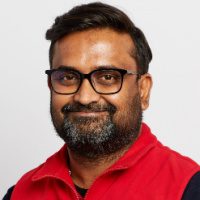
Shekar Natarajan joined AEO in 2018 and in his current role, he oversees AEO’s global supply chain, including origin operations, global inbound, global trade management, distribution and fulfillment management, delivery operations, customer promise, inventory allocation and management, and supply chain innovation and algorithmic sciences. Shekar also leads all aspects of Quiet Platforms, which includes the logistics businesses AirTerra and Quiet Logistics that were acquired by AEO Inc. in 2021. Prior to joining AEO, Shekar served in a variety of leadership roles across the supply chain and technology industries including Coca Cola, PepsiCo, Anheuser-Busch InBev, the Walt Disney Company, Walmart and Target. His 20-year career includes 70 patents, three books, and recognition as a leading supply chain innovator. Connect with Shekar on LinkedIn.
